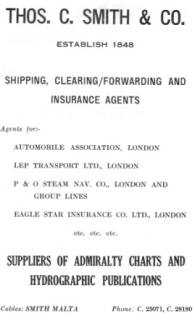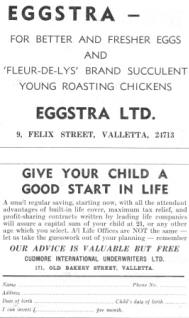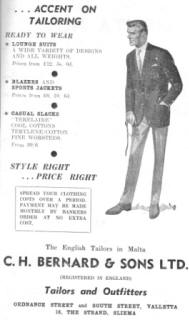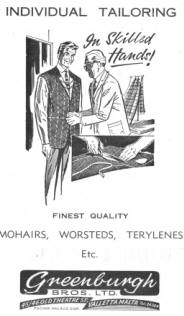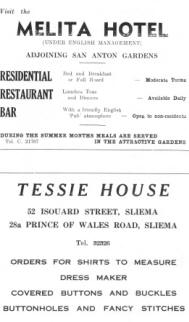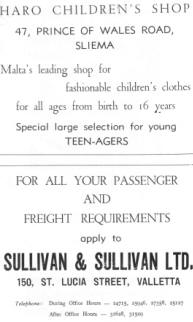![]()
![]()
![]() Best viewed in Internet Explorer
THE PIRATES OF PENZANCE (1949) : D'Oyly Carte : Free Download
Best viewed in Internet Explorer
THE PIRATES OF PENZANCE (1949) : D'Oyly Carte : Free Download
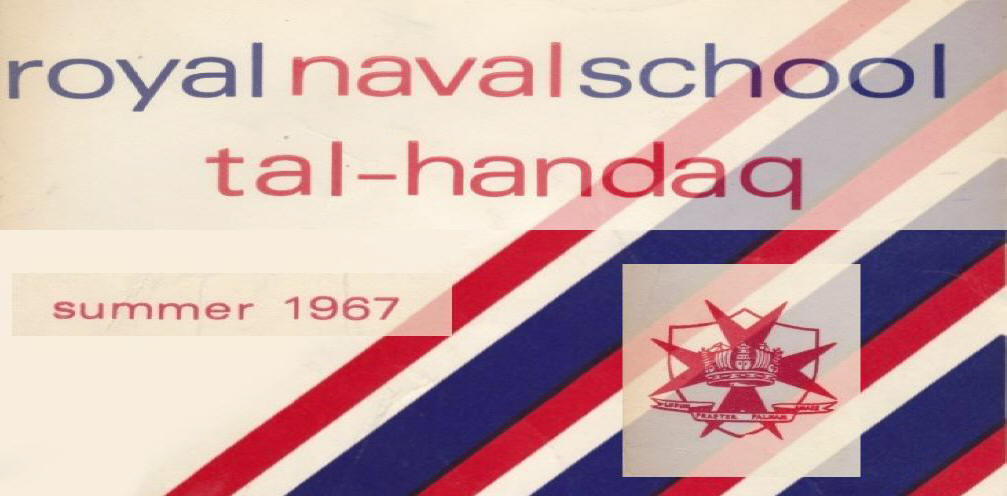
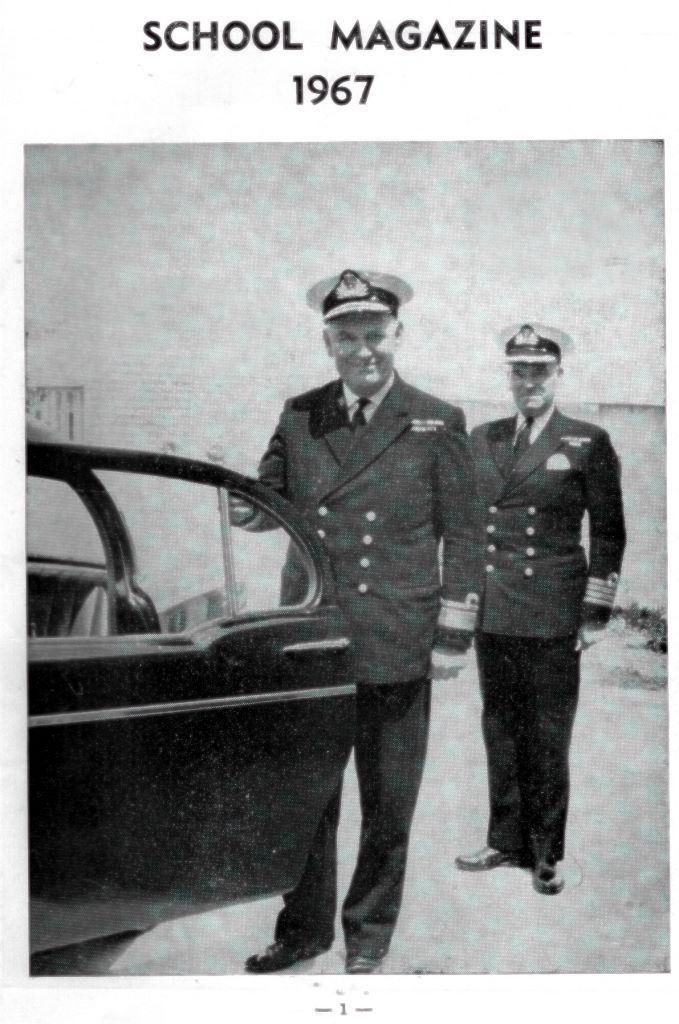
Instructor Rear Admiral AJ Bellamy OBE MA, The Director, Naval Education Service, on his visit to Tal Handaq, 17-18 April.
Admiral Bellamy was Headmaster of Tal Handaq from 1951 - 1954.
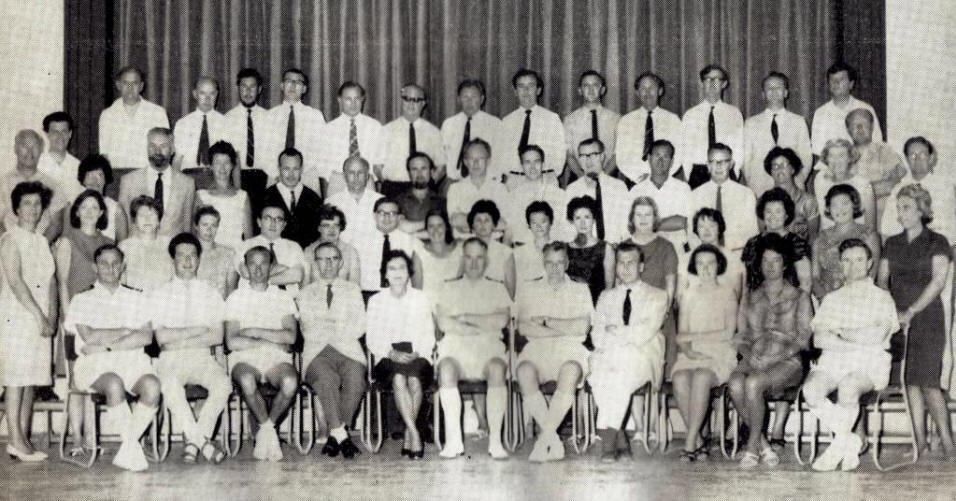
STAFF
HEADMASTER -- Instructor Captain H.C. Malkin, M.A., Barrister-at-Law,
Royal Navy.
DEPUTY HEADMASTER Instructor Commander G. Coupe, M.A., Royal Navy.
SENIOR MISTRESS Miss J. Yule, B.A., Head of English Department.
TEACHING STAFF (in order of length of service in Tal-Handaq)
|
Mr. P. Parker Miss M.J. Bailey Mr. C.V. Morris, Dip. Ed. Mr. R.A. Dickerson, A.T.D. Mrs. D.M. Dewstowe Mr. A.F. Gallacher, M.A. Mr. R.B. Witherspoon Mr. R.J. Gerrard, L.Mus.L.C.M. Mrs. P.M. Gerrard Mr. F.G. Kitson Mr. K.G.W. Pappin, B.A., B.Comm. Mr. H.M. Griffiths Mr C.W. Barraclough, B.Sc., F.R.G.S. Mr. E. Battye Miss B.A. Cater Miss G. Reed Mr. T.E. Moore, A.M.I.E.E. Miss N.W. Chisholm, B.Sc. Mr. W.M. Alexander, M.A. Mr. J.H. Bowen, D.L.C. Mr. O.K. Martin Mr. E.J. McAllister, B.A., D.L.C. Mr. R.J. McGillivray Mr. J.P. Ratcliffe, B.A. Mr. G.A.H. Smith Mr. A. Walters Mr. E.J. Lewis Mrs. P.M. McGillivray Mr. J.A. Paley, B.A. Mr. R.C. Tatton, D.L.C. Mr. T.S. Moyle, Dip. Bib.Rel. Instr. Lt. Cdr. J. Blackmore,B.Sc., R.N. Mr. H. Hitchcott, B.Sc.,A.R.I.C. Mr. E. Devine Miss D. Dibley Mr. R.E. Tomlinson Instr. Lt. Cdr. K. Swift, B.Sc., R.N. Mrs. V.E. Hitchcott, B.A. Mr. B.S. Jackson, B.A. Miss J. Lamb, B.Sc. Mrs. D.W. Hull, B.A. Mr. F.C. Houston, B.A. Mr. S. Singleton, B.A. Miss P. Melling Mrs. C.S. Singleton, B.A. Mr. H.W. Harris, B.A. Mr. L. Garvey, B.Sc. Miss M.P. Williams Mrs. M.I. Parry Mrs. P.M. Barraclough Mrs. A.S. Cross Mrs. P. Macdonald Mrs. P.D. Armstrong Mrs. E.A. Dowdall, B.A.
|
Craft * Cookery * General Subjects * Art and Craft ( +) General Subjects * Modern Languages ( +) Librarian * Music (+) General Subjects (*) Technical Subjects (+) Geography and Commerce * P.E. and Geography * Geography (+) Mathematics * , Art and Design * Needlework * Remedial Classes * Biology ( +) English * P.E. (Boys) * Maths and Science * English * Mathematics * Classics (+) Technical Subjects * Technical Subjects * General Subjects * P.E. (Girls) * Modern Languages * Technical Subjects Religious Instruction ( +) Mathematics (+ ) Chemistry ( + ) Maths and Science Shorthand and Typing * Mathematics * Physics (+) Geography History Biology French French and English Art and Craft P.E. (Girls) General Subjects History (+) Physics * Music Cookery Needlework General Subjects English General Subjects General Subjects |
ADMINISTRATIVE STAFF
Mr. D.T. Sheppard Bursar
Miss J. Balehin Secretary
Mrs. F.A. Hartwell Assistant Secretary
Mrs. P.J. Clements, S.R.N. School Sister
Mr. S.J. Mayo Med;cal Clerk
Mr. E. Plant School Warden, Storekeeper and Chargeman.
( + ) Head of Department. (*) Post of Responsibility.
MAGAZINE COMMITTEE
Chairman: Mr. C.V. Morris. Literary Editor: Mr. E.J. McAllister.
Art Editor: Mr. R.A. Dickerson. Advertising Manager: Mr. A. Walters.
CONTENTS
|
Instr. Rear Admiral A. Bellamy
O.B.E., M.A., Director, Naval Staff ... .. .. .. .. .. .. 2 Foreword ... ... ... .. .. .. .. .. 3
Sicily Expedition ... ... ... 27 Old Pupils' Page ... ... ... . 33 Dear Brutus ... .. ... .. ... .. 35 Careers . ... ... ... ... ... ... .. 39 Chartres ... ... ... ... ... ... 44
|
Staff
Departures .........
45 Guide Company ........ 52 Mr. E. Plant, M.B.E. ... 54 Advertisements................. 65 Sports Section.................. 78 Drake House Reports ... .. 89 Nelson House Reports ... 92 Hawkins House Reports . 96 St. Vincent House Reports 97 Athletic Sports 1967 ... ... 101 Boys' School Records ... ... 104 Girls' School Records ... ... 105 Swimming Gala 1966 ... ... 106 Advertisements ....... 112
|
FOREWORD
I should like to thank all those who have played a part in the production of this magazine. The School is very lucky to have such an efficient Magazine Committee, who produce each year a valuable record of the main events of school life which many will read again with pleasure in the future.
We started this School Year with several major improvements to the buildings. The new Science laboratories, the language laboratory, and the extensions to the Metal workshop have all proved their worth during the year. So have the three new tennis courts, which have added much impetus to this game; and the new Office block, which is a very handsome addition to the buildings. I am very grateful to my predecessor, Instructor Captain C.L. Broad, for all his hard work in the planning of these improvements.
This term we were very glad to welcome the Director of the Naval Educational Service, Instructor Rear Admiral A.J. Bellamy, O.B.E., M.A., to the School. He spent two days with us and gave us a thorough inspection. Admiral Bellamy was Headmaster of Tal-Handaq from 1951 to 1954 and so this was a sentimental journey for him.
He found, I think, that "plus ca change, plus c'est la meme chose''. In spite of rumours about the rundown, there are more children at Tal-Handaq this year than last; and we shall continue to be fairly full for a year or two yet. This will mean several new faces among the staff next September, whom we shall be glad to welcome to the School.
Regretfully, however, we said goodbye to the last Commander-in-Chief, Mediterranean, Admiral Sir John Hamilton. He and Lady Hamilton have been good friends to the School and have taken a keen interest in our activities. Our best wishes go with them.
H.C. Malkin Headmaster.
DUNERA TRIP 1967
At 2.30 on the 4th February 1967 a party of 55 pupils from Tal Handaq
boarded M/S Dunera for a cruise in the eastern Mediterranean visiting
Izmir, Beirut, Haifa and Heraklion.
The Dunera left Grand Harbour at 16.00 hours and was soon well under way
for Izmir, the second seaport of Turkey. On the 2nd day out from Malta
the volcanic archaepelago of Thira was (sighted. The islands of this
group spread out in a horse shoe formation, and represent all that is
left of a great volcano which destroyed itself in a violent erruption,
many years B.C. The party saw large pumice mines, and villages which
clung to the steep island sides.
On the 3rd day the ship rounded Cape Nikolas and entered the Izmir
Channel. By 9.00 the ship had docked; and the party had boarded coaches
to visit the ancient harbour of Ephesus, now situated many miles inland,
due to the silting up of the rivers nearby. Here the guide showed us the
fine marble carvings', theatres and temples. Next we went into the
nearby hills to visit Mary's tomb. It is a belief that Mary came with
.Saint John to Ephesus after the Crucifixion. On the return to Izmir,
the party visited the tomb of Saint John. Upon arrival back in Izmir,
the party had two hours in which to shop for souvenirs. The Dunera left
Izmir at 0200 hours and sailed south then east towards Beirut, the
seaport Capital of the Lebanon.
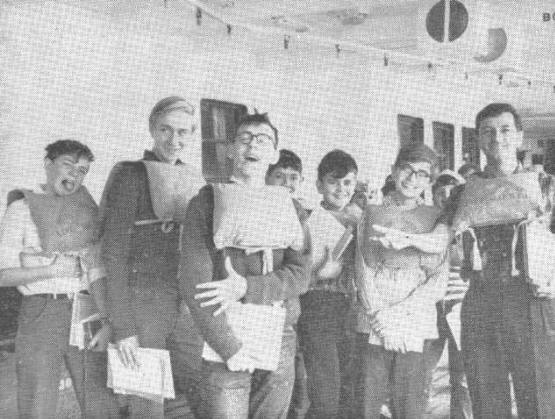 Life-boat drill on board the M/S Dunera.
Life-boat drill on board the M/S Dunera. 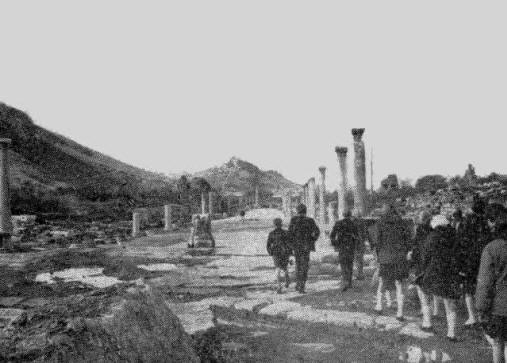
Before we arrived in Lebanon the education staff delivered lecture on the country, the capital and on Byblos (one of the oldest continually inhabited places). It was in Lebanon, a country which exists by the buying and selling of foreign currency and bonds, that the sterling crisis began due to extremely heavy selling of sterling. We visited Byblos, one of the finest examples of "living history" anywhere. Here beside the modern village are the castle of the Crusaders, and the tombs and temples of the ancients. Afterwards we looked round Beirut itself, an impressive city with a Franco-Eastern tone to it. Lebanon is indeed a country of great history, We left Beirut at night on February 10th and sailed south towards Haifa, the next port of call.
The Dunera docked at 10,00 on Saturday llth. As we left the Dunera, everybody was given a bag of oranges and grapefruit. We boarded coaches and were taken through the port, north towards the old walled city of Acre. About a third of the people who live in Acre are Arabs, and it was surprising to find that Arabs who live in Israel are so numerous, and also enjoy equal rights to 'social services etc., with the Jews.
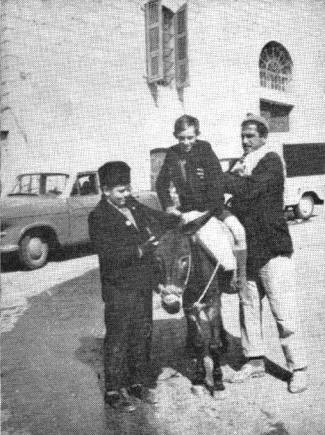
As the party entered the old city a beautiful view could be seen of Acre Bay with Haifa far to the south. From here we walked through a very old quarter of the city, which was most interesting. Then we visited the largest Mosque in Israel. It was set in beautiful gardens. From here we again boarded coaches and travelled to the sea of Galilee region.
It was a long route, but the view of the Sea of Galilee, and the unforgettable snow-capped Syrian mountains overlooking the whole panorama made it worth it.
We passed through Tiberias, and visited some fine old mosaics in the Church of the Multiplication of the loaves and fishes. Here a magnificent wine, produced by Benedictine monks could be obtained at a small cost. We ate lunch by the Sea of Galilee under the trees.
From here we set off back for the ship, and passed the Mount of the Transfiguration with the sun setting behind it. We visited Nazareth where Jesus lived as a boy. The only difference Between the time of the visit of the angels and Tal-Handaq being the television aerials.
Nazareth.
Finally to end an unforgettable day, the coach climbed Mount Carmel to see Haifa by night.
The following day we set off by coach to visit Jerusalem, and stopped at the ancient castle of Caesarea. In Jerusalem, the divided city, we saw the tomb of King David, the room where the last supper is supposed to have taken place and the Shrine of the Book where the Dead Sea Scrolls are kept. This is truly a magnificent building surrounded by modern 'mechanical sculpture. Inside the effect was a cave, where the Scrolls were kept at the temperature and humidity at which they were found in order to preserve them.
The party returned to the Dunera, and the ship sailed that evening.
Arriving in Crete at 1300 the following Tuesday, he party split up, and one half visited the town whilst the others went to Knossos. The town was full of shops, but those who went to Knossos saw the countryside which was extremely green and fertile. The ruins at Knossos have been restored in part to look, as it is believed they looked, when the Palace was at its peak of power. Unfortunately the weather was uncommonly cold, and it rained. However the rain stopped later on, and we visited a very fine museum in Heraklion.
The Dunera sailed from Heraklion at 33.00 bound for Valletta. During these last days Tal Handaq won the quiz, scrapbook, logbook, fancy dress and other prizes. Tal Handaq girls sang in the ship's concert.
Things were very well organized aboard the Dunera, with dances; and film shows, lectures and excellent recreation facilities, It was altogether a most enjoyable trip, though the elements could have been kinder.
GAYNOR HAMLEY and PETER ROSS LVI Arts.
TAL-HANDAQ
With apologies to William Blake.
And did those feet in modem times Walk upon Tal-Handaq playground? And were the prefects still giving lines To any loafers hanging round ?
And did the head-boy forgive our deeds, But warn us not to cheek him more ? And was the Headmaster scared to death To open 2A's classroom door?
Bring me my Pen of fifteen colours ! Bring me my Pen of nine carat gold ! Bring me my Book, with tattered cover ! Bring me my Plimsolls, very old !
I will not cease from mental sums, Nor shall my pen sleep in my hand, Till we have re-designed Tal-Handaq In Malta's brown and barren land.
DAVID BUTT 2A1.
THE DEFEAT OF MARLENE THE WITCH
She had lived in the woods all of her life
In the woods near the castle of the Baron of Fyfe
And her name was Marlene
She was a wicked old witch who would curse and trick And if you ventured too near you would feel her stick.
No-one could catch her, and no-one dared try, Until one day old Andrew did cry,
"The Wizard of Oz,"
At once there was a bustle, a hue and a cry, "Send for the Wizard, old Marlene to try".
Two hundred king's) soldiers searched night and day Fo>r the Wizard who co'uld keep the Witch at bay
And his name was the Wizard of Oz. They found him at last, he agreed to their plan, To fight the old terror, hand to hand.
He sprang an attack on the wicked Marlene,
And fought 'til she gave in and was sent to Saltdean
Where she was jailed
And there she spun her weave with withered hand Until the Devil beckoned her into his fiery land.
SHIRLEY COOPER - 1A1.
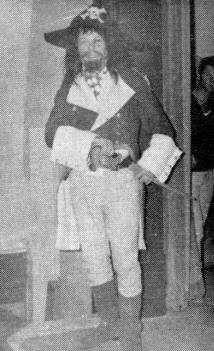
The Gilbert and Sullivan Opera, The Pirates of Penzance, was produced at the end of the Christmas term.
Rehearsals began early in the term and although the result was most enjoyable it had meant a great deal of work not only for the soloists and chorus but also for Mr. Dickerson and his crews of scenery constructors, Mr. Gerrard, Mr. Barraclough and also Mrs. Gerrard who arranged the dancing. Thanks should also go to all those who helped with costumes.
The soloists were John Field (The Major General), Alistair Wild (Frederic), Penny Tatton (Mable), Wendy Coupe (Ruth), Robert Field (The Police Sergeant), Mr. Martin (The Pirate King), Elizabeth Jameson (Edith), Mr. Tomlinson (Samuel), Mary Jones (Kate) and Joan Stratton (Isobelle).
The four outstanding performers were Penny, Robert, Mr. Martin and Mr. Tomlinson. Their acting was good and so was their singing. Penny should be especially congratulated on her performances of "Poor Wandering One'' which is difficult to sing.
Jon and other girls were also very good and Alistair made a bold effort.
The girls chorus were weak at the beginning, but soon gained their feet and made a success of the finale of Act I and all of Act II. The boys needed a great deal of rehearsal. At one point it was thought that they really would not be good enough, but they certainly did well on the night.
The hall was filled every night. The Commander-in-Chief came on the Monday night and at the end he came up on stage and congratulated the two leading ladies, saying that he had enjoyed the performances very much.
Despite criticism by people that Gilbert and Sullivan is hackneyed the presence of so many at the performances must justify the production each year.
WENDY COUPE VI Science.
HEADMASTER'S REPORT
PRIZE DAY
-- 11th November 1966Prize Day wag held on llth November 1966, when the Captain of the Fleet, Captain T. Hay, Royal Navy, took the chair. The prizes were presented by the Chief of Allied Staff, Mediterranean, Vice Admiral Sir Hugh Martell, K.B.E., C.B.
The Headmaster's report was as follows:-
Much of what I say in this Annual Report will have happened before my time, but I feel that one of the best aspects of Tal Handaq School is its sense of continuity. Much of this is due to its excellent teaching staff, many of whom have now given some years of devoted service to the school; to the constant efforts! of the school warden, Mr. Plant, and his staff; and to the unfailing help which has- been so freely given by so many in Malta. Among these I must mention the Director of Education, the Chevalier Vassallo and his Staff, who give so .much willing help in the increasingly complicated organisation of school examinations; Our Administrative Authority, the Commander-in-Chief and his Staff; and the other Services, .Army, R.A.F. and M..B.P.W., all of whom have helped the school greatly during the last year.
The size of this .school has increased surprisingly this term to nearly 900, about 50 more than la&t Autumn. The numbers of Royal Navy pupils have fallen, but those of the other Services) and Ministry of Defence Civilian Families have increased. This makes the school a very good example of Inter-Service Co-operation and, as I have mentioned, we are certainly lucky that so many in Malta have such an interest in its welfare.
We have a very full Upper School again thus year -- that is the 4th, 5th and 6th Forms. Indeed there are over 200 children in the 5th year alone and this has made some of the sets larger than I would like. The whole of the Upper School is now fully comprehensive, which means that over 300 children are working to individual timetables. This, as you can understand, makes administration far more complicated than in the old days, when a child was merely put into a form with the same programme for all its members. Now, in the Upper School, there are sets for each main subject and the pupil who may be good at Maths but not so good at English finds himself, or herself, in a group of the same ability. Gradually we hope to extend this system further. Most of the work involved in this, comprehensive curriculum has fallen to my deputy, Commander Coupe, without whose ability and hard work it could not have been done so successfully.
Perhaps, at this stage, I might say a word about the Comprehensive School. This type of school is becoming increasingly the pattern in the United Kingdom, but, from time to time, a few parents voice misgivings about it. It is said that the very able child will suffer as a result of being lumped together with others who may not have the same academic gifts. The evidence does not support this, because the gifted child will normally benefit, like others, from a large school, (and some of the London Comprehensives are 2,000 strong), which means a larger staff and hence a larger number of subjects which can be taught by real specialists. At the same time everything goes to show that the average child gains much from this system - - and, most of us, after all are about average. In this school we have pupils who, having failed the 11 + have gone on to achieve notable successes in G.C.E. Advanced Level subjects. At Tal-Handaq we have always been comprehensive in one sense, namely that all Service Secondary Children in Malta have attended the school. Now that we offer a wide selection of courses in *he Upper School, the curriculum is tailored to all levels of ability, both academic and practical.
Last term's G.C.E. 'A' level results were excellent with 70 passes at 'A' level, 7 at 'O' level and only 2 failures, there were 8 passes out of 14 in the 'S' level papers, with 4 pupils gaining distinctions. The G.C.E. 'O' level results were also very good with 65% passes, and all 9 candidates passed R.S.A. Physics, 5 with credit.
The Pitman's .shorthand and typing results with 50 passes were not quite so good as last year's' but were satisfactory.
The Certificate of Secondary Education got into its stride this year. This examination is especially designed for those who might not quite make 'O' level, but who should have a recognition on paper of their abilities on leaving school. A Grade 1 in C.&'.E. is the 'equivalent of a G.C.E. 'O' level pass, so that the relatively few Grade 1 passes achieved in most subjects suggest that few pupils were entered for the C.S.E. who should have taken 'O' level G.C.E. instead. On the whole, our results have been very satisfactory and very much what was expected by the teaching staff.
The school has also had a successful year of sport. One of our problems is that of school fixtures, as we are the only Services Secondary School in Malta. This term, therefore, we have .arranged fixtures for our first teams; in Rugby, Soccer and Girls Hockey against adult sides and so far we have done very well. It is also very encouraging to see the enthusiasm for the Inter-House Games which was shown well last term in the Swimming Gala and the Athletic Sports.
While on this important subject of sport, I should like to pay a tribute to the Royal Engineers who have so successfully levelled the grounds above the school for future use asi playing fields. This was undertaken by them as a training exercise and a very [successful one it has been for the school. We hope soon that we shall have changing room and groundsmen which will enable these playing fields to be put into use.
On the material side, indeed, there have been many improvements: to the school in the past year. Several of these resulted from the recommendations of the H.M. Inspectors of Schools, who visited us in the Spring of 1965: and, the -most important has been the completion of the new Physics1 and Chemistry Laboratories. In the middle of June, we had a major reorganisation of classes so that work on these buildings could start; and the school is very grateful to the S.N.S.O. for the timely loan of twenty two huge containers', fitted with shelves, in which the Science apparatus from the main laboratories was stored during the construction period. We took the opportunity to reallocate equipment so that Physical Science can be taught as a single subject to the upper streams in the first year, instead of as the separate subjects, Physics and Chemistry; and boxes of equipment and graded sets of experiments have been prepared for use in the lower streams.
Another -major improvement will be the conversion of a room into a Language Laboratory. This as you may know is the modern method of language teaching. Each pupil has! a separate both in which recorded conversations are carried on with the teacher, who has a control panel, or Console, at the front of the classroom. The room is now nearly finished, and all the apparatus has arrived from Ranks, the manufacturers. We hope it will soon be in action.
There have been improvements to the Metalwork room and, perhaps most popular of all, three excellent new tennis; courts have been built and are now in full use. These, as you can imagine, have been a great boom to the girls and most successful Inter-House Matches have already been played on them.
These important improvement? owe much to the great interest of the Commander-in-Ghief and his Stan, especially the Captain of the Fleet, Captain Hay, in the school. At a time when money is short, they have had to find a place in competition with other very necessary improvements .in the Ccmmander-in-Chief's programme of block grant expenditure. Their successful completion, of course, has been the responsibility of the M.P.B.W., whose j interest and high standards of workmanship have produced such excellent j results. Unfortunately, the Regional Director, Sir Leslie Tyler is prevented by other duties from being with us to-day, but we are very glad to welcome some of his senior staff and, to say thank you for meeting the School requirements so well. It cannot have been easy to produce such excellent work in the short period of the school holidays, hut, as always, M.P.B.W. has risen I to the occasion; and no request from the .school, however, small, is ever left unanswered.
One of the snags of the buildings, of course, is that this not a purpose ; built school. Constant additions have been .made over the last twenty years or so, and the buildings are in good shape on the whole. But, of course, we could do with further improvements. This hall is hardly large enough to accommodate the whole school standing, and large numbers of parents and pupils are unable to attend to-day because of shortage of space. We could do with I another classroom and our laboratories could 'be extended further to cope with the increasing demands of the vital Science subjects.
Another important advance over the last year has been some development in the operation of a Child Guidance Service. We have, of course, for many years been grateful for the periodical visits of the School Medical Officers and I the ready co-operation we have always had from the R.N. Hospital when a child is injured in school or at games. The Naval Medical Officer of Health has also always been ready with advice quite recently Ms staff spent a morning testing the school water supply - - but in addition to this valuable help, the R.N. Hospital has been able to give special help to a few children, who! find life especially difficult because of a disturbed background. It is perhaps remarkable that among Service families, whose children are often moving from one school to another, there should be so few of these children, but a Child Guidance Service is now established in Germany, the Far East and Cyprus where, of course, the commitments are much greater than in Malta. It is therefore very encouraging to see its development here and I am very grateful to Surgeon Rear Admiral Gurd, whom we are glad to. welcome here to-day, and his Staff for their help in all these important matters. I hope we shall be successful in finding a Speech Therapist, whose services I may need if I continue much longer!
A final word -- and it is very much the same as my predecessor, Captain Broad (to whom I am very grateful for all his work for the school) said last year, This school has a high reputation and the credit for this must largely go to the children, With very few nameless exceptions in school, they are smart, well behaved and self reliant; and they work well and play well. I have mentioned games, (and thank you to all concerned for the excellent ground we use) but not all of them may be gifted on the Sports field. They can, however, take an active part in School Societies, such as the Literary and Debating Society or the Art Club, sing in the annual Gilbert .and Sullivan (the school is producing the Pirates of Penzance next month), or act in the Easter play, (Noel Coward's Blithe Spirit was successfully produced last April). The girls have a guide troop and some children have done well in the Duke of Edinburgh's Award Scheme A party of 9 boys training for the Gold and Silver Awards spent ten days in Sicily during last Easter holidays. Several of the children have done well at sailing and have their helmsmen's certificates. All these activities help in the building of character and these interests will stand them in good stead throughout life. By playing a part in a team they learn to give and take, and get on with others. I know that most parents encourage their children to get the most out of school and the staff here 'have little difficulty in leaving most of them to do so. But this is in school, and there are few who let the side down (by their behaviour out of school and I do wish that their parents: would take a greater interest in their activities. It is the parents' responsibility to know what their children are doing out of school, where they are and who they are with; and it is very disturbing to find that some parents do not know at all.
The School has had a successful year and with the growth of our facilities and continuation of our high standards will continue to deserve its reputation in the future.
Cactus plants in the School Grounds
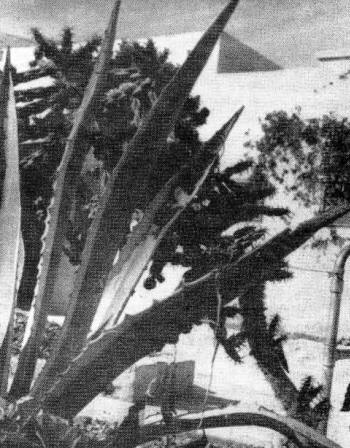
THE SEA
In my mind I see
the lovely sea,
With the sun glittering down,
The fish
with the swift swimming formation,
The seaweed
waving about in the shimmering blue sea.
JAMES NASH 1C4
MY MIND
In my mind come thoughts so dear, As my departure time draws near, Sights and sounds Familiar places. Friends and relatives Smiling faces.
I long for the English countryside, The little country villages. Picking blackberries, Gutting grass,
Collecting twigs on winter days, Drinking tea around the fire, little things that mean so much, Long forgotten -- memories.
These things 1'll do on my returning, I used to find a bore. In my heart there is a yearning. All these things I'll do once more
Through the woods and fields I'll roam, And down the country lanes. On green Spring days With April showers. Here I'll laze, Through the summer hours. Frosty Autumn, With winds that blow. Icy Winter, Crisp, white snow. Never again will I leave my home, In England.
EILEEN ASHCROFT 4Q
G.C.E. EXAMINATION RESULTS SUMMER 1966
ADVANCED LEVEL: OXFORD
JOHN ATHERTON Pure & Applied Mathematics, Physics, Chemistry.
JANE BEADLE English Literature, French.
JACQUELINE BUBB British Constitution, Needlework.
PETA BUSWELL Art.
MARGUERITA CANTWELL Chemistry, Biology.
LEE CHAMP French, German, Geography.
STEPHEN COMMONS -- English Literature, Geography (with Merit on 'S' Paper).
JACQUELINE DAIN Art.
ANNE DENNISON Pure & Applied Mathematics, Physics.
MICHAEL ELLIOTT Art.
JACK FERRETT Pure & Applied Mathematics, Physics, Chemistry.
JOHN FIELD -- English Literature (with Merit on 'S' Paper), Geography (with Distinction on 'S' Paper), French.
MARTIN FULLER -- English Literature, British Constitution, Geography (with Distinction on 'S' Paper).
ROBERT GALE History, Art.
ANNE GARDNER Art.
JENNIFER GOLDSACK English Literature, History, British Constitution.
MOYA GRAHAM French.
LYNN GREGORY Art.
ALTHEA HOWE Art.
VIRGINIA HULL English Literature, Cookery.
WILLIAM JEFFRIES Pure & Applied Mathematics.
PAUL JENNER English Literature, History, British Constitution.
RICHARD KNAPMAN -- Geography.
KENNETH LAURENCE -- Chemistry.
ROBIN LEVIN -- Pure Mathematics, Applied Mathematics (with Distinction in 'S' Paper), Physics (with Merit on 'S" Paper).
KEITH LUCAS Art.
MONICA MAZURE Art.
JOHN MOORE British Constitution, Geography (with Distinction on 'S' Paper).
ANN MOSS -- Art.
BARBARA MURPHY -- English Literature, French, British Constitution.
PENELOPE PARKER Cookery.
DAVID RADFORD Art.
DOROTHY ROWLAND -- French, Geography.
JOHN SADDLER - - English Literature, French, Geography (with Merit on 'S' Paper).
STEPHEN SPENCE Art.
SUSAN TOLSON - - Pure & Applied Mathematics, Physics, Chemistry (with Distinction on 'S' Paper).
NIGEL VAUGHAN -- British Constitution.
MICHAEL WINKWORTH Pure & Applied Mathematics, Physics.
G.C.E. EXAMINATION RESULTS SUMMER 1966
ORDINARY LEVEL: OXFORD
ANN
BAGGOTT English Language, English Literature, French. DOROTHY BAGGOTT
- English Language, English Literature, French, Religious Knowledge.
LEE BARRABY Metalwork, Engineering Drawing. STEPHEN BILLIGE Art.
PATRICIA BIRCH English Language, English Literature. STEPHEN BREWSTER
Art. FELICITY SURGE French, Geography. PETA BUSWELL Geography.
KATHLEEN BYRNE -- English Language. ROBERT CANNON -- English Language.
JEANNE CANTWELL Music. JOHN CARTER Geography, Mathematics, Physics,
Chemistry, Engineering Drawing. GEORGE CAVARRA Engineering Drawing.
BARRY CLISSOLD -- English Language, English Literature, Latin, French,
History (British), Mathematics. GILLIAN COE English Language, English
Literature, Religious Knowledge, Cookery, Art. STEPHEN COMMONS
Geology. WENDY COUPE -- English Language, English Literature, History
(British), Mathematics, Chemistry, Biology, Cookery, Music. SUSAN
CRAWFORD French. KAREN CROOME English Language, English Literature,
Religious Knowledge, Art. SANDRA CROSS Cookery. SUSAN CURLIS English
Language. JACQUELINE DAIN - - History (Foreign), Italian. DAVID DUGMORE
- Religious Knowledge, Geography, Human Biology and Hygiene. PETER EDGE
English Language, English Literature, French, Religious Knowledge,
Geography, Mathematics, Physics, Chemistry. LYNN EDMUNDS -- Biology.
MICHAEL ELLIOTT Mathematics. PATRICIA ELLIOTT English Language,
English Literature, French. GLORIA EVANS English Language, Religious
Knowledge, Cookery.
ANTHONY FERRETT English Literature, Latin, French, Italian, Geography,
Additional Mathematics, Physics, Chemistry. JANICE FORD English
Language, English Literature, French, Italian, Geography. ELIZABETH
FORRESTER English Literature, History (British), Biology, Cookery.
ANNE GARDNER English Literature, Religious Knowledge. MOYA GRAHAM
Italian. BRIAN GUNNS Additional Mathematics. LINDA HACK WORTHY
Cookery. GORDON HALLIDAY -- English Language. GAYNOR HAMLEY English
Language, English Literature, French, Geography, Additional Mathematics,
Physics, Chemistry, Biology.
WILLIAM HAMPSON Art, Religious Knowledge. JOHN HART -- Metalwork, Art. GEORGE HAYHURST Art. RICHARD HOCTOR Metalwork, Engineering Drawing. ELIZABETH HOOLEY -- English Language, English Literature, History (British), Biology, Art. DAVID HOPKINSON English Language, English Literature, French, Geography, Mathematics. ESTELLE HUSK English Language, English Literature, French, Mathematics. GLORIA JACKSON -- Cookery. ELIZABETH JAMESON Italian. SARA JEFFRIES History (British), Religious Knowledge. KATHRYN JENNINGS Italian. MARY JONES Music. LINDA KEEN Needlework. RICHARD KNAPMAN -- Additional Mathematics. KENNETH LAURENCE -- Additional Mathematics. RONALD LEEMAN -- German, Art. CAROL MATTTNGLEY Italian. TOM MATTINGLEY English Language, English Literature, Latin, German, Geography, Mathematics, Physics, Chemistry, Commerce. LINDA MAY Cookery. MONICA MAZURE -- French, History (Foreign). CHRISTOPHER McCREADY - - French. COLIN MILLARD -- Religious Knowledge, Geography, Physics, Chemistry, Biology. JOSEPHINE MOGRIDGE English Literature, Latin, French, Art. JOHN MOORE -- Geology. NORMAN MORGAN - - English Literature, French, Geography, Additional Mathematics, Physics, Chemistry, Biology. JENNIFER MORLEY -- English Language, English Literature. BRIAN NICOL English Language. MARGARET PARKER-HUSBAND -~ English Language, English Literature, History (British), Religious Knowledge, Mathematics, Commerce. ANGELA PATTERSON Art. JENNIFER PERKINS English Literature, Geography, Religious Knowledge, Biology, Cookery, Art. RICHARD PULLAN English Language, English Literature, French. Geography, Mathematics, Engineering Drawing. SANDRA PULMAN - - English Literature, Religious Knowledge, Biology, Human Biology and Hygiene. ANGELA RADLEY - English Literature, French, British Constitution, Commerce. SALLY RATHMELL English Literature, Religious Knowledge, Geography, Cookery, Art. LINDA RICHARDS -- French, Needlework. MICHAEL ROBINSON - - English Language, English Literature, Religious Knowledge, Geography, Mathematics, Commerce. MICHAEL ROSE ~- Religious Knowledge, Metalwork, Engineering Drawing. PETER ROSS - - English Lanugage, English Literature, French, Religious Knowledge, Geography, Mathematics, Physics, Zoology. BONNIE ROUT Human Biology and Hygiene.
COLIN RULE English Language, English Literature, French. ALAN RUSSELL Religious Knowledge. DAVID SCOTT English Language, English Literature. MALCOLM SENIOR -- English Literature. JENNIFER SHILLITO - - English Literature, German, Geography, Cookery, Art. ROGER SIMPSON History (British), Mathematics, Metalwork, Engineering Drawing. JOHN SMITH English Language, English Literature, History (British), Engineering Drawing. MALCOLM SMITH -- English Literature, Geography, Mathematics. SUSAN SMITH English Language, English Literature. STEPHEN SPENCE English Literature, History (British), Mathematics.ANTHONY STACKPOOLE -- Engineering Drawing, Art. JOSEPH STIMPSON -- Art. ALFRED TAGLIAFERRO Geography. ALAN TRUDGETT -- English Language, English Literature, French, Mathematics, Physics, Chemistry, Biology DAVID WEAVER -- Woodwork.RUSSELL WINTERBOURNE English Language, English Literature,German, History (British), Geography, Commerce. GILLIAN WITHERSPOON - - English Language, English Literature, Latin, French, History (British), Mathematics .REGINALD WOODCOCK Mathematics, Woodwork.
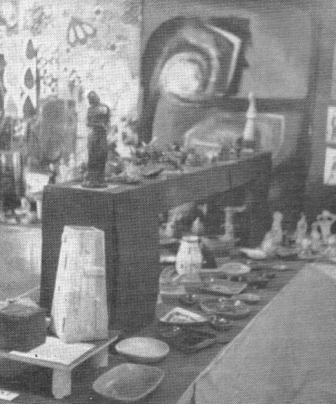
Open Day Pottery Display
G.C.E. EXAMINATION RESULTS
AUTUMN 1966
ORDINARY LEVEL: OXFORD
MICHAEL ADAMS Mathematics. MALCOLM ALDWORTH Mathematics. ELIZABETH BAILEY -- Mathematics. PHILIP BAKER Art. STEPHEN BILLIGE -- History (British). PATRICIA BIRCH Commerce, Cookery, Needlework. SUSAN BOYD Mathematics. ALAN BUE Art. KATHLEEN CAREY -- French. KAREN CROOME Biology. JUDITH CROSS Mathematics. SANDRA CROSS -- English Literature, French. ANGUS DONALDSON - - English Language, Mathematics. DAVID DUGMORE Commerce. LYN EDMUNDS -- French, History (British). LINDA ELSON -- Additional Mathematics. GLORIA EVANS -- History (British). ROBERT FIELD -- Mathematics. HEATHER FRASER Human Biology and Hygiene. BERYL GEORGE History (Foreign). PAUL GRIMSON -- Mathematics. DEREK GUYMER English Literature. CAROLINE HAY German. RICHARD HOCTOR -- Mathematics. ELIZABETH HOOLEY Commerce, Human Biology and Hygiene. DAVID HOWELL Mathematics. ELIZABETH JAMESON Italian. HELEN KERN - - Mathematics. BRENDA KILPATRICK -- Mathematics, Biology. JANET LAND Mathematics. PATRICIA McLAUGHLIN Mathematics. COLIN MILLARD Additional Mathematics. JOSEPHINE MOGRIDGE English Language. JENNIFER MORLEY -- Religious Knowledge, Art. JOHN NICHOLAS Mathematics. ANNE PENNINGTON -- Italian. JENNIFER PERKINS -- English Language. LINDA PERRY -- Mathematics. SANDRA PULMAN - - English Language, History (British). ANGELA RADLEY -- Mathematics. MARJORIE RAFFEL -- Mathematics. SALLY RATHMELL English Language, Ecology. FRANCES ROONEY Commerce. PETER ROSS Chemistry, Art. COLIN RULE Biology. DAVID SCOTT Geography. MALCOLM SENIOR Mathematics. JENNIFER SHILLITO English Language, French, Biology. CHRISTOPHER SIMMONS -- Mathematics. MALCOLM SMITH Religious Knowledge, Physics. DEREK SPAFFORD Mathematics. ANTHONY STACKPOOLE -- Mathematics. ALFRED TAGLIAFERRO English Literature. PATRICIA WALTON Cookery. DAVID WEAVER -- English Language.
CERTIFICATE OF SECONDARY EDUCATION
SOUTHERN REGIONAL EXAMINATIONS BOARD SUMMER 1966
Certificates
were awarded as follows: ALAN ARMITAGE History,
Technical Drawing. PHILIP BAKER -- English, Geography,
Mathematics, Technical Drawing, Metal work. LEE BARRABY
English, Geography, Mathematics, Metalwork. STEPHEN BILLEGE
English, Woodwork, Mathematics, Technical Drawing. ALAN
BLUE English, Geography, Commerce. STEPHEN BREWSTER
English, Woodwork, Mathematics, Technical Drawing. ROBERT
CANNON -- Woodwork, Mathematics, Technical Drawing.
GEORGE CAVARRA English, Geography, Mathematics, French.
DAVID DUGMORE -- Woodwork, Mathematics, Commerce. PETER
GAMBLE -- Geography, History, Mathematics, Metalwork.
EDWARD GOULDING Woodwork, History, Technical Drawing,
Commerce GORDON HALLIDAY -- Geography, History.
Mathematics, Metalwork, WILLIAM HAMPSON English,
Mathematics, Technical Drawing. JOHN HART English,
Geography, Mathematics, Technical Drawing, Metalwork.
RICHARD HOCTOR English, Geography, Mathematics,
Metalwork, Commerce. JOHN HYLAND English, Mathematics,
Technical Drawing, Metalwork. BERNARD IBBS Domestic
Science, English, Geography, Woodwork, Mathematics. JAMES
JOYNER -- Art and Craft, English, History, Technical
Drawing, Metalwork. RONALD LEEMAN -- History, Metalwork.
KEITH LUCAS Geography. BRIAN NICOL Mathematics.
DENNIS OSBORNE - Art and Craft, English, Geography,
Woodwork, Mathematics. Technical Drawing. CHRISTOPHER PEDDER
-- Geography, Mathematics, Technical Drawing. JAMES
RAFFERTY - - English, Geography, Technical Drawing,
Metalwork, French. MICHAEL ROBINSON -- Mathematics.
MICHAEL ROSE -- English, Mathematics, Metalwork, French.
COLIN RULE Geography, Mathematics. ALAN RUSSELL
- - English, Mathematics, Technical Drawing, Metalwork. French.
DAVID SCOTT Mathematics. MALCOLM SENIOR
Mathematics. PHILIP SIMPSON Art and Craft, English,
Geography, Woodwork, Mathematics, Technical Drawing. ROGER
SIMPSON -- French. RUSSELL SMITH -- Woodwork,
Mathematics. ANTHONY STACKPOOLE - English, Woodwork,
History, Mathematics, Technical Drawing. ALFRED TAGLIAFERRO
Mathematics, French. ALAN TRUDGETT History.
EDMUND TUMILTY - - Art and Craft, English, Geography,
Mathematics, Technical Drawing, Metalwork. ROBERT WARNE
Art and Craft. ANN BAGGOTT Geography, Mathematics,
Typewriting, Shorthand. DOROTHY BAGGOTT History,
Mathematics. JANE BAXTER -- English. PATRICIA BIRCH
Geography, Mathematics, Commerce, Typewriting. KATHLEEN
BYRNE Geography, History. KITTY CHAYTOR --
Geography, History, Typewriting. SUSAN CRAWFORD --
Mathematics, Typewriting, Shorthand. KAREN CROOME
Mathematics, French. SANDRA CROSS Geography,
Mathematics. SUSAN CURLIS Commerce. LYNN EDMUNDS
Geography, Mathematics. ALICIA EICHMAN - Geography,
History. PATRICIA ELLIOTT -- Mathematics. ELIZABETH
ELLIOTT Art and Craft, English, Geography,
Mathematics.Typewriting. GLORIA EVANS Commerce.
ELAINE FELL Art and Craft, English, History. JANICE
FORD Mathematics, Typewriting, Shorthand. ELIZABETH
FORRESTER Mathematics. HEATHER FRASER -- Geography,
Mathematics, Typewriting. ANNE GARDNER -- Mathematics.
JUDITH GODDARD Art and Craft, English, Typewriting.
LINDA HACKWORTHY -- English, Geography, Mathematics.
ELIZABETH HOOLEY -- Commerce. VIRGINIA HULL
Typewriting. DENISE HUMPHRIES Art and Craft, English,
History, Typewriting. GLORIA JACKSON Geography,
History, Typewriting. SARA JEFFRIES Mathematics,
Commerce. LINDA KEEN -- English, Geography, Commerce.
MARGARET KENNEDY -- English, Typewriting. LORRAINE MARTIN
Geography, Mathematics. LYNDA MAY English, Geography,
Commerce. SANDRA MILES -- English, Typewriting.
JOSEPHINE MOGRIDGE -- Mathematics. MARGARET
PARKER-HUSBAND -- Typewriting, Shorthand JENNIFER PERKINS
Mathematics. SANDRA PULMAN - - Mathematics. ANGELA
RADLEY Mathematics, Type-writing, Shorthand. SALLY
RATHMELL Mathematics, French. LOIS REED
Typewriting. LINDA RICHARDS Typewriting. FRANCES
ROONEY - - English, Mathematics, Commerce .BONNIE ROUT
-- Geography, Mathematics. JENNIFER SHILLITTO --
Mathematics. SUSAN SMITH Mathematics, French,
Typewriting. SUSAN STARKEY -- English.ANNE TERRY
-- Mathematics.VIVIEN TURNER Mathematics.PATRICIA
WALTON -- English, Geography, History, Typewriting. DAVID
WEAVER - English, History, Mathematics, Technical
Drawing,Metalwork. RUSSELL WINTERBOURNE Mathematics.
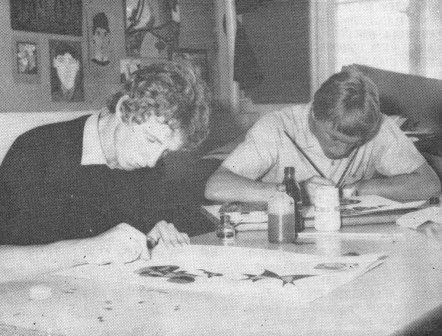
Tony Hampson and Ron Leeman designing for silkscreen.
CERTIFICATE OF PROFICIENCY IN THE USE OF ENGLISH
OXFORD MARCH 1967
Passes Grades I - III
Jennifer Archer 1. Marilyn Borland 3 Brian Gunns 3 Elizabeth Jameson 1 Kenneth Laurence 2 Christopher McCready 2 Aidan Mompalao de Piro 3 Anne Pennington 2 David Radford 1 Vivien Turner 2
Meek, anxious faces peered
from behind thick books or from under desks twice their
size. When would it ring?The teachers looked sick with
fear and mad thoughts were running through
their minds shall I make a dash for .the cupboard or
shall I make it to
the staffroom ? Too late!
The bell had rung !
The stampede had started!
Gone were the meek, anxious faces and in their places were sly, misichievious glares. They were free! They all ran, regardless of anyone who happened to get in their way, to the bus park where the bus drivers cringed behind the steering wheels in absolute terror. The first few to reach the buses hung themselves out of the windows, shouting to urge on their followers. By the time the whole screaming mob had arrived the buses were swaying perilously and nuts and bolts were flying everywhere.
The drivers revved up their engines and the mob screamed and shouted even louder. 'Why are we waiting?' they cried. At last the buses moved and the gates came into sight.
Another term at Tal-Handaq was over!
CONNIE TWISS 4Q.
The winner of this year's Rotary Watch presented by the Malta Agent of Rotary Watch Company for the best article in the magazine is Sally Rathmell, L6A. Janet Morley, 3A, and Lesley Burton, 2A1 have been awarded book tokens as runners-up.
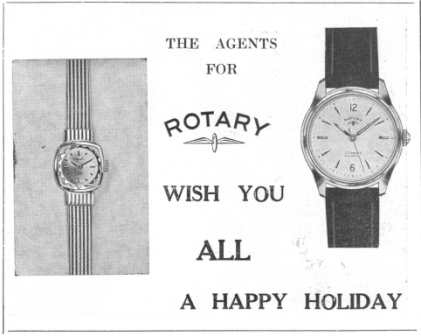
DUKE OF EDINBURGH AWARD SCHEME
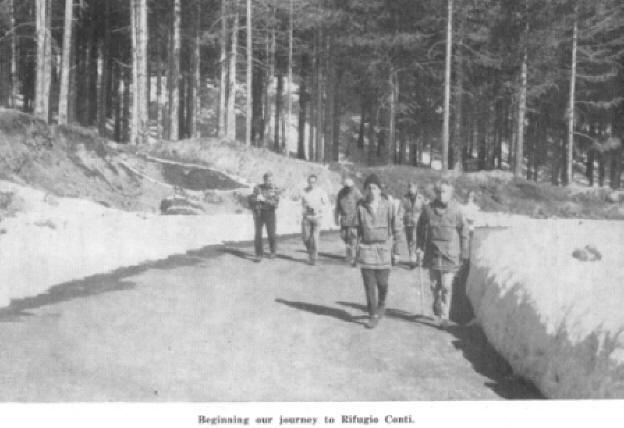
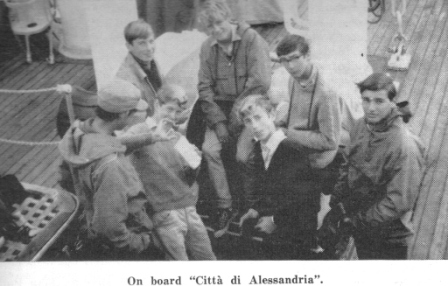
SICILY EXPEDITION, 1967
This year's expedition to Sicily, in connection with the Duke of Edinburgh's award scheme, was very successful, and everyone who took part enjoyed the trip, despite how rigorous it was.
Fourteen people took part, six of whom were undertaking the bronze standard, two the silver, and three the gold, with three supervisors. They were: David Caley, Paul Crossley, John Elliot, John Murphy, Evan Potts and Robert Ross (bronze); Robin Bailey and Ian Carpenter (silver); Richard Hoctor, John Portelli and Alexander Siddall (gold); and Mr. Houston, Mr. Tomlinson and Connor Nannery as supervisors.
We left Malta on March 23rd, arriving back on the 30th.
Before the start of the expedition, a lot of preparation had to be carried out -- there were two weekend camps at Ghajn Tuffieha, followed by a walk back to Sliema; several other walks were undertaken, and each member of the group walked unsupervised several times, in order to toughen his feet. Besides this, equipment had to be issued - - rucksacks, tents, compasses, anoraks, water-bags, sleeping bags, etc. Spare clothing had to be acquired, tickets bought, and Italian currency obtained. Finally, everything was (almost) prepared.
On the evening of Thursday, 23rd March, Maundy Thursday, everyone assembled for embarkation on the boat "Citta di Alessandria". Most of the boys slept in their sleeping bags among the cars below deck. The following morning we disembarked in Syracuse, and walked the 1/4 mile or so to the station where we took a train to the town of Giarre. Here, we had to walk to another station to> .take the "Cireuim Etna" train. It climbed to the small town of Linguaglostsa, where we all managed to get off intact. From here, Etna looked very imposing before us. After a short stop to brew up some soup or coffee, we left the station in a little Fiat which was to take us the ten miles up to our camp-site. And it did, but not before the driver had given us heart-failure by nearly hitting another car, and insisting on cornering on the wrong side of the road. Despite the fact that we found the camp-site Tinder more than a foot of ,snow, we were pleased to get there.
After pitching our tents on a site that was fortuitously clear of snow, we ate, and then gathered in one of the chalets to discuss our plans, which were revised because of the conditions. Easter having fallen two weeks earlier this year, it was anticipated that it would be colder than last year. However, no one had expected1 there to be so much snow around, so it was decided that we could not go much higher than the base camp. Basic plans were made for the three expeditions of the different group;. Everyone then went to bed to get a good night's sleep. This day had been tiring, but there was a lot more effort to be made in the near future,
GOLD AWARD GROUP
SATURDAY, 25th MARCH
The three engaged on the gold expedition, Richard Hoctor, John Portelli and Alexander Siddall, plus their supervisor, Connor Nannery, set off downhill on a bearing of 14 degrees. This meant walking through the coniferous forest and as far as an old lava stream; from there we would walk on a bearing of 134 degrees for the same distance; finally, on a bearing of 254 degrees. Theoretically, this would bring us back to the base camp after three days' walk; in practice, it wasn't that easy !
To walk on a bearing accurately it was necessary to line the compass up with a suitable object in the distance on the (bearing which we were following walk to this object and repeat the process. In the forest this was not easy, because it was usually necessary to take a bearing on a tree very close to us, any distant landmark being obscured. This showed our progress to a very great extent as we were hindered by the snow as well. The land was also gullied, and our feet slid on the -now and fell into natural 'booby-traps holes between rocks where we sank up to our knees in the snow.
At last we were clear of the trees, and the snow became less deep. For a short while we made slightly better going, until we found ourselves in a beech plantation, which again made navigation slow, difficult and tedious. Although the air temperature was high, our 'boots had filled with snow, and our feet were frozen. Only Connor Nannery, who had water-proof leggings on, had warm and dry feet. We stopped for lunch in the plantation and wrung the water out of our socks.
Soon after restarting, we found ourselves almost out of the snow, so (since we had encountered no streams) we decided that we had better stop and melt some snow for water. After we had collected enough to last us the night, we carried on, and some time later, following more difficult downhill progress, we reached the old lava stream. Here we stopped to plot our position on the map, then we started on the second leg walking on a bearing of 134 degrees. After covering about half a mile on our new course, we found a reasonable camp-site, so, since it was now early evening, we pitched our tents and prepared for the night. Although the first day of the expedition had been strenuous, we had the feeling that the worst was yet to come. We were not wrong.
SUNDAY, 26th MARCH
We all slept well, despite an outside temperature which dropped below freezing. We set off early, trying to make a good speed, but soon found ourselves in some of the worst country we had yet encountered. We were in undergrowth, with brambles, stunted trees, and leafy bushes. It was practically impossible to take bearings and sometimes we had to be satisfied with a position only ten feet further on from the last. Fortunately, this did not last long, and we were soon in more open country. This was an old wide lava stream, merely broken-up rock. It was almost completely barren, with only a few stunted bushes able to survive. However, it was broken up by gully after gully as soon as we had slithered down one side and 'scrambled up the other, we had to repeat the process. None of these valleys contained a drop of water, and since we were now not carrying any, we had to carry on until we found a well. There were one or two false alarms, when we found well-like edifices: they were either sheds, or were guarded by padlock?. Eventually, however, we came across an open well, where we all washed, and took on water for our meals
In the afternoon we managed to cover a fair distance, and crossed some striking geographical features, the 'most imposing of which was a dry river bed which we crossed at a one-time waterfall. This was composed of solid blue rock, worn smooth by hydraulic action. That evening, we found a camp-site which, although sloping, suited us all right; owing to the shortage of water, we could not afford the luxury of a wash before turning in.
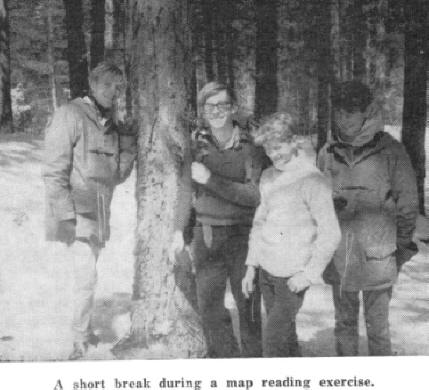
MONDAY, 27th MARCH
We broke camp at 8.30 in order to give ourselves a full day in which to return. We were walking at a slightly greater angle than the estimated one, because we had walked further the second day, and we were hoping to return directly to the base camp on the new course, where the old one would have taken us a good distance to the left of it. As it turned out, this judgment was almost perfect.
The first part of the walk was through wooded country, but we were soon out of this. It was then open country with a ridge in the distance, so two of the group went ahead while the other two guided them onto- the correct bearing. After taking a few more short bearings until we were again in open country, we found ourselves overlooking a wide open valley and were lucky enough to be able to take a bearing on a tree in the far distance. We then set off towards this, taking the line of least resistance, not having to (keep exactly on course since our distant marker was distinctive enough to be found easily even if we temporarily lost sight of it. We passed through some very beautiful country until we found ourselves in a valley running alongside the spur on which "our" tree was sited. To reach it we had to go up the side of the spur that proved to be easier said than done. We started by scrambling up a scree slope, but when we had nearly reached the top we found our way completely blocked by brambles. It took us half an hour to hack our way through these, owing to our inadequate tools for this purpose. When we did reach the top. it was only to find that, if we had walked another 50 yards along the valley floor, we could have walked up a sloping path to the top ! At this point, we heard someone blowing a whistle from a spur on the other side of the valley, and finally John Portelli picked out Mr. Tomlinson and Mr. Houston, who had come to meet us. We stopped and made soup while they joined us, via the path.
Almost immediately we struck out for the road which was to our right. instead of heading straight back to the camp, a route, the masters told us, which would be very difficult and would take a long time. We walked up the road which was crowded with people enjoying the Easter sun, the snow and ice cream. We arrived back at about 2.30 p.m., tired out, but very pleased with what we had accomplished.
SILVER AND BRONZE AWARD GROUPS
As the Gold Award people left us and walked downwards the rest of us set off uphill. The ground rose and the snow grew deeper and deeper. We spent the day doing an exercise in walking for fixed times on predetermined compass bearings. Walking in two groups of four, our object was to walk, as it were, each along one side of a triangle, change direction after a specific time and meet in the middle of the third side of the triangle.
The snow was very deep and slowed our progress considerably. Our boots. socks and trousers were soon soaked and our feet numb with cold for the rest of the day but the exercise was a success and we learned a great deal from it. especially in coping with difficult conditions. When the two groups rejoined we made for our 'tents to get our clothes dry for the next day.
SUNDAY, 26th MARCH
We were up at 6.30 and set about breakfast with gusto, achieving slightly more success with the 'Ready Brek', which today was almost edible. Breaking camp -we set off down the road through the snow. When we reached the snow-line we were again sent off in two groups of four to walk on fixed bearings in a two-day expedition, making diagrams of the type of country we crossed and a precise log of our progress.
We had left the pine forest and were walking through fairly thick terraces of oaks and beeches. The going was easy until we left the terraces and came to a steep drop overgrown with thistles and brambles. There was no alternative but to continue on our bearing, straight through it. The undergrowth became (thicker and thicker and the brambles and brushwood were a constant, painful impediment. We took it in turn to plot the bearings;, act as markers and chop a way through the undergrowth. Gradually we reached the bottom of the slopes and 'began walking along level ground. Unfortunately this did not last long and the going got distinctly harder as we got higher.
Suddenly the ground became very steep and compass bearings were almost impossible as we went through massive clumps of trees, bushes, pot-holes and brambles. This laborious progress continued until we reached a lava-flow and a decent camp site. We pitched our tent and cooked a meal. The day's casualties were a twisted shoulder (Robert Ross) and a twisted ankle (Jack Elliot).
MONDAY, 27th MARCH
We woke up to find icicles on the tent and the ground covered in frost; the little water in our water-bags had frozen solid. Snow did little to improve our 'Ready Brek'.
Progress on our new bearing was relatively easy as we spotted a distant object right on our course. Later in the morning, however, our difficulties began again: a large drop had to be crossed. We got down it by swinging down the branch of a tree, but our satisfaction at reaching the bottom was cut short by the problem of getting up the other side. There was little vegetation to hang on to, the .slope was very steep and it was only after many attempts that we made it to the top with the ground crumbling beneath our feet. Then followed a succession of terraces, each about eight feet high, where the pick-axe proved invaluable, A full rucksack becomes a diabolical weight under these conditions.
Eventually we came upon a stretch of level ground and our next bearing fell on a distant obect fluttering pink in the breeze. It was a nylon nightie hanging on a bush. A gentle slope then led us through fairly dense beech trees and back to the road. Our compass work was over and we headed uphill towards the camp.
It was Easter Monday and the road was packed with picnicking Sicilians and Fiats by the hundred. Ice-cream was a very welcome change. Infuriated drivers were trying to thread their way through groups playing football, groups; dancing, groups talking and their horns were in constant competition with transistors. As we made our way up the snow-covered road we were bombarded with comments, questions and snowballs.
TUESDAY, 28th MARCH
We rose early and at last made some decent 'Ready Brek' - - we were almost beginning to like it. The whole party now packed up and set off down the road back to Linguaglossa: in contrast to yesterday there was not a soul in sight. We covered the eight miles at a steady pace and pitched our tents on a plot of land near the railway station. Groups of children gathered round us to watch and seemed fascinated, especially by our gas-stoves. They were very friendly but we kept a sharp eye on our equipment.
The next morning we broke camp in record time to catch the 7.25 train to Giarre. The train was bulging with students returning to college, us and our unwieldy packs. We had a pleasant day shopping and eating in Catania and Syracuse, chatted! late in the lounge of the 'Alessandria' and then went down into the car hold for our last night of the expedition.
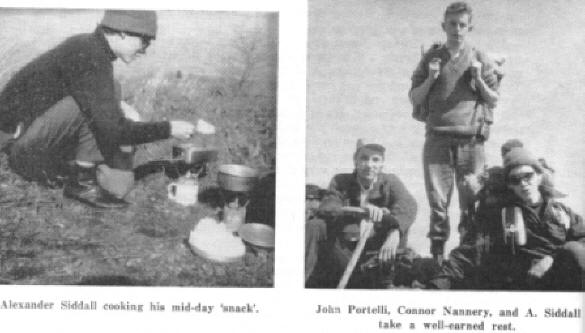
|
THE DUKE OF EDINBURGH'S AWARD SCHEME REPORT The school year has proved to be an active one with regard to the scheme. In the fields of physical activity, rock climbing has proved popular, candidates making several ascemts in the Madalena area. Two gold award candidates, Peter Ross and Christopher Stephens completed a "residential course" in Gozo, the first of its kind in Malta, Here they participated in rock climbing, map reading, hiking and an escape and evasion exercise. The course, a new part of the scheme, was very enjoyable. The climax of the schemes activities was the expedition to Etna in Sicily. The party consisted of 1) Gold group:-Alexander Siddall and Richard Hoctor. 2) Silver:- Ian Carpenter and Robin Bailey. 3) Bronze:- David Caley, Paul Crossley, John Elliot, John Murphy, Evan Potts, and Robert Rosa. Prior to the actual expedition all candidates underwent a strict training programme, necessary to attain the high standards of fitness and initiative demanded by the award. In spite of the snow an enjoyable time was had by all. Life saving was chosen by candidates for the public service part of the award. Eleven of them gained the Bronze Medallion of the Royal Life Saving Society as a successful culmination to its training programme. Normal hobby and project work has been carried on, candidates working on subjects ranging from reading to model-making. An exhibit was sent by the school to a "recruiting drive" at Blata-il-Bajda and two broadcasts were made by candidates about the award on B.F.B.S. This year, so far, two bronze awards have been presented to Brian Erwich and Richard Hoctor. We are particularly grateful to Connor Nannery of R.A.F. Luqa, who in the process of gaining his Gold award has aided candidates with their expedition training.
We feel sure that anyone entering upon the
scheme next year will have an
|
OLD PUPILS' PAGE
Tal-Handaq, being what it is, with former pupils scattered, one might say, throughout the British Isles and Overseas Service Stations, manages however to keep contact with a fair number of old pupils; many who have sometimes left in the lower forms write to say how much they enjoyed their time here but unfortunately we do not always manage to keep track of those who complete their VI form course here and go on to Universities and other forms of Further Education. Please let us hear more from those who are starting life in some of the many varied other careers open to boys and girls nowadays.
Rosemary Dearden got a B.A. degree at Exeter last summer and is now doing her Education Course at Newcastle, Angela Salter, Pam Hinton both completed University courses at Manchester and I believe both are now married. A wedding which was a real Tal-Handaq Re-Union was that of Susan Brierley to Sub Lieutenant Peter Mansfield R.N. at Manadon just before Christmas; the two bridesmaids Paula Goodale and Jennifer Browning were both former members of Form VI while among the guests were Instructor Captain and Mrs. Morgan and Instructor Captain and Mrs. Mannering as well as Instructor Commander and Mrs. Des Clayes.
Rosemary Andrews, after working in a bank, has now joined the Civil Service Executive Branch and is working at Maidstone; she and Rosemary Dearden paid me a surprise visit when I was in England at Christmas.
Keith Holmes is reading Geography at Leeds University where I believe John Payne is also reading Geography. Andrew Wilkin, after a year in Florence, graduated at Manchester University with Honours in Italian. Bill Duncan is enjoying his course at Bretton Hall College of Further Education, he often sees Alec Brown who is at Manchester College of Music. Rayner Brammal is in his first year at the Imperial College of Science, South Kensington. At Manchester Universities are Geoffrey Randal and Graham Roberts. Lorna Tierney, Sheila Smith and Margaret White are all at Edinburgh University. At Birmingham College of Education are Malcolm Chesney and Alan Mogridge while Jacqueline Bubo is at Stockwell College and Susan Pearson at the College of Home Economics, Bath. Pamela Gard is in her last year at a College of Education in Hertfordshire.
Melanie Lusty is now a qualified Radiographer working at the Winchester Hospital and Sandra Christie is at Exeter University. Pauline Morgan and Anne Tyson are doing Librarianship and Jean Proctor is in her last year at Manchester doing Physiotherapy. Althea Howe will be starting a similar course in London in September. Brendan Breslin is with the Ministry of Defence and hopes to get posted to Malta soon. Christopher Ruoff has started a Nursery Garden at Gloucester while his brother Richard is at Loughborough Art College.
Jane Carver is at the end of her three year's 'course at Nonnigton College of Physical Education and has been appointed as P.E. Mistress at a Secondary Modern School not far from her parents' home at Bath. Kathleen Hines has also just finished a teachers' training course. Wendy Morrell is teaching at Maidenhead Grammar School. Sheila Cruickshank, a contemporary of theirs, after completing a Secretarial Course in Italian, has worked for the Cambridge University Appointments Board and is now Secretary to the Recruitment Training Manager of Esso Europe, where Lesley Turner is also working.
In the RAF are Walter Willman who is now at Khormaksor and Bernard Hoctor who is at Bally Kelly, Northern Ireland. David Gerrard has now passed his second Mates' Certificate and is with the R.F.A. line. Ian McCall is with B.P. but his Christmas card had no address the same may be said for Anne Merch-Chammon, Barbara Murphy, Suzanne Prater and Pamela Beadie who all sent me cards but with no news or addresses, so I hope they will see this article and accept my thanks for their kind thoughts.
Carol Wansbury who Jeft in 1965 is now in Singapore but is shortly leaving for Australia where she hopes to take a teacher's training course. Joan Price, now at the Windsor Girls' School, Hamm, is completing A levels while Jacqueline Dain is doing the same at Plymouth. Kathryn Jennings is at school at Western Super Mare where she will be learning Russian next year.
I should like to conclude that all of us on the staff of Tal-Handaq enjoy hearing from those of you who have left and we are only too pleased to have visits from any who find themselves in Malta. This year we have seen Alec Brown, Alan Mogridge, Lee Champ (at the Holborn College of Arts on an intensive Common Market course) and Susan Tolson (Bristol University) -Martin Fuller (at Exeter and John Saddler at Plymouth College of Technology). I shall end by thanking all of you who have written to me enabling me to produce this article and, I hope more will write during the coming year. Sahha !!
J.Y
THE KANGAROO
I roam through the bush under the Australian sun I have a day of rest and a day of fear. My race is hunted and killed By whom ? By man !
I dodge the boomerangs, I dodge the 'guns, Both of these are the weapons of man, The only animal I fear.
My father was killed, My mother was wounded, My 'brother was captured and taken away,
I often wonder when my end will come.
I hear a man ! Two men ! I see them. They both have guns I must run and hide, Their weapons are too great for me.
A shot! They missed again. A third ! And their target is hit.
My end has come, Like many other, How long will my race last ?
When will we be able to roam without fear?
ROLAND VELLA 3C1
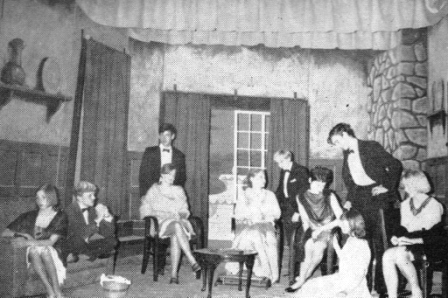
EASTER PRODUCTION
'DEAR BRUTUS" by J. M. BARRIE
As usual the school produced a play for the end of the Easter term. The producer was Mrs. Cronin, who has since left the school to return to the U.K. Rehearsals started early in the term and slowly the cast and stage technicians (in the capable hands of Mr. Moore and Mr. Dickerson) were bullied, persuaded, and coaxed to perfect their parts. Slowly at first and then with speed as first night crept closer, things took shape out of the apparent chaos. Scripts were discarded -- reluctantly at first -- tangles of wire and odd lamps scattered around became a first class lighting system and heaps of curtains, canvas, ropes, spars, pots or paint and the occasional ladder, changed into a well designed and well put together set, almost (or so it seemed), overnight.
Many people thought that the choice of play was a bit ambitious for a school, with all its limitations, to put on successfully. I am inclined to agree, for, although Mrs. Cronin did ,an admirable job, the play tended to drag a little and seemed slow in starting. This was not a result of any reluctance or negligence of those taking part, for everyone was enthusiastic and obviously enjoyed the whole thing. No! the reason was that this sort of play is best left to the professionals, Surprisingly the most difficult act, in the wood, turned out to be the 'best. The parts of Will Dearth (Peter Edge) and the girl (Felicity Brooke), were extremely well acted and they rightly deserved applause. The mainstay of the play was of course, the butler. Played by Will Watts, he kept the pace of the play going. His constant bickering with Lady Caroline (Jane Moyle), with whom he teamed up with in the fantasy world of the wood, was convincing; his cocky "Cockneyness" resulting in quite a few laughs. Not to be overlooked were the performances of Lois Reed, who was a great success as Madame Arcarti in the production of "Blithe Spirit" last year; and Beryl George who played Mrs. Coade.
Congratulations to Christopher Stephens, who was Stage Manager for the first time and who did a difficult job extremely well. Lighting was again in the capable hands of Robert Cannon who proved his skill in last year's production and who has proved a valuable asset to the school in many productions. Congratulations too, to the set Designer, Michael Elliot, and the many people behind the scenes who contributed to the production.
CHRISTOPHER McCREADY
EXCAVATIONS AT SAN PAWL MILQI
For the past four years during the autumn months of October and November, an Italian archaeological mission has been carrying out excavations on three sites in Malta. The team is made up of archaeologists from the Universities of Rome and Milan.
Two years ago, I visited the site known as San Pawl Milqi, which lies nearly a quarter of a mile off the main road at the village of Burmarrad. My interest being very great in this field of work, I soon became a daily visitor to the place, and before long I was accepted as a junior member of the team.
Last year, when the mission was here once again, I found my way there each day after school. I spent every free moment of my spare time and each Saturday at San Pawl Milqi. Fortunately the site is only two miles from my home.
My role was that of interpreter for the Maltese workmen, who knew very little English and hardly, if any, Italian, while only one of the archaeologists knew some English. I found myself entrusted with the task of delicate lifting, scraping and brushing off of sediment. The job was given to me as it was feared the hefty workmen may well have damaged quite a few articles. Cleaning of potsherds and the inevitable jig-saw puzzle with broken important finds was part of the daily routine. All this gave me a wonderful feeling of achievement and excitement. I felt that in a very small way I was helping the mission contribute towards Malta's heritage. And at the same time I was gaining the experience I had been hoping to find for some time.
According to an ancient and cherished tradition, the few slabs of stone which lay half buried around the tiny church of San Pawl Milqi, were considered to be the remains of a villa where Publius, the local Roman governor had welcomed Saint Paul after his shipwreck. What was known before the excavations were started was merely that the remains of the villa were Roman.
During the digging on October 23rd, 1965, a block of stone inscribed with the great Apostle's name was brought to light. A few days later, on October 26th, we found a small slab of mortar on which was scratched a rough image identified as that belonging to the 'Apostle Paul'. On another side we traced the outlines of a ship wrecked. Other finds were figures of a fish and a cross, the emblems of Christianity. During the same excavation of 1966, at San Pawl Milqi, extensive courtyards and portices of various ages were revealed. Some of these dated as far back as late 200 B.C. Professor Michaelangelo Cagiano de Azeredo of the Catholic University of Milan, who is also Director of the team in Malta, has presented a theory that this villa was the Local Roman governor's summer residence and that he offered hospitality to Saint Paul and the rest of the shipwrecked party, there.
The annual lecture of the season's dig was given at the Catholic Institute at Floriana. All the archaeologists from Tas-Silg and San Pawl Milqi were there to answer questions and present their theories. Professor Cagiano de Azeredo invited me to attend. When I arrived there he told me to sit in the front seats which were reserved for the archaeologists. I had a grand time. After the lecture, the professor presented me with a book, which he wrote himself, "Archaeological Evidence of the Pauline Tradition in Malta". This book is written in Italian, and it is a most treasured possession, because I know that in the years to come, I shall look at it and remember those days when I first started digging.
J. VINCENTI 3B
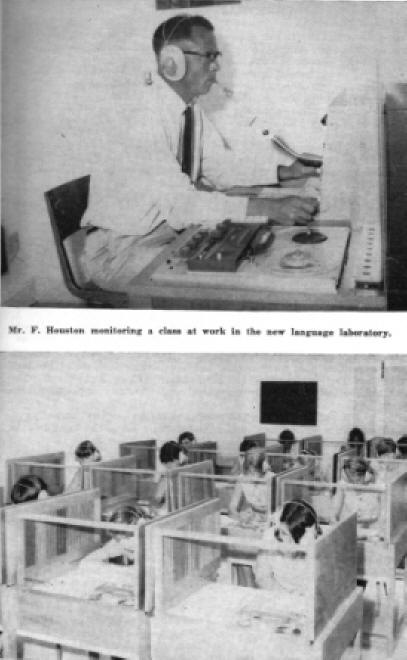
CHRISTMAS CONCERT
The Christmas Concert was a complete success. The choir sang superbly. Two of the songs were sung again toy request of Commander Coupe, these were "Haster Now Ye Shepherds" and "The Cowboy Carol".
The songs were from different parts of the world. Some of the songs were modern English ones, others were traditional. The Cowboy Carol was an American folk song, and the Pinewood Tree was German.
There were two soloists, namely, Kay Goldsack and Janet Hitwell. Some Maracas were used in "Haster Now Ye Shepherds", and they improved the song no end.
Due to lack of space, only the first, second and third forms were at the concert. Those who were there thoroughly enjoyed it.
Miss Williams prepared the music for the choir, and also conducted the choir. Mr. Singleton played the accompaniment.
P. NEAL.
ORCHESTRAL CONCERT
On the 2nd of February 1967, the band of the Royal Marines under the able direction of Lieutenant W. Shillitto came to entertain the first and second year pupils of Tal-Handaq.
The concert consisted of many enjoyable items, and held the interest of the whole audience throughout.
The band commenced by playing for us a selection from the "Pirates of Penzance" which we all enjoyed. Then followed a tune called "Pizzicato" which I thought was very well played and also very enjoyable.
Another item, called "The Toy Symphony'' was unusual but very tuneful, it was a descriptive piece wherein many individual instruments were portrayed.
The two 'Pop' songs which the band played "Elena Rigby" and "The Yellow Submarine" were loudly applauded and obviously appealed to the audience.
"I am a Music Man'' was an entertaining number and very interesting, it was partly spoken by the band and included many solos, the band told us the names of the instruments and showed us how they sounded.
The concert ended with tune called "My Little Darling" which contrasted well with the somewhat noisier "Pop" songs.
I really enjoyed the concert and am very grateful to the band for coming. I am sure all the other pupils enjoyed the concert as much as I did.
VICKI EDWARDS - IB.
THE SEA
A Shoal of fish pass
me by.
I can see a reef
Covered in sea urchins and sea weed
Swaying in the
current.
Look ! there's an
octopus
Sitting on a rock.
Oh, how I wish
I was a fish! GRAHAM
HEWTTT 1C4.
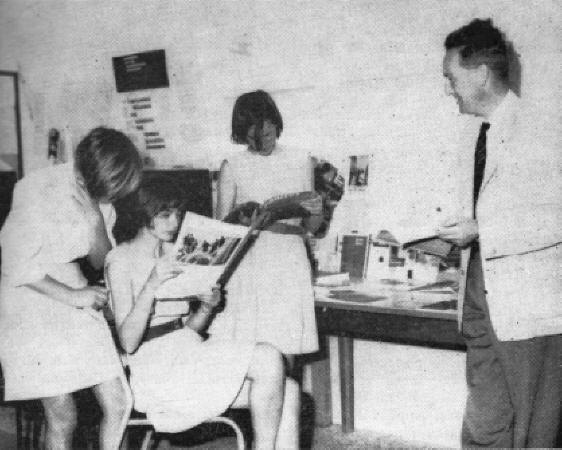
Mr. A. Gallagher discussing careers with members of the 3rd year.
CAREERS AND FURTHER EDUCATION
In November 1966 we had our annual visit from the Careers Advisory Officers. Miss Tompkins and Mr. Strickland interviewed more than a hundred pupils, mostly from Fifth and Sixth Forms. General talks on careers were also given to Fourth formers.
Comments on these interviews are received at the school later in the year and suggestions made to pupils interviewed; parents are invited to discuss the prospects of a career for son or daughter at any time of the year but normally by appointment on a Thursday afternoon.
The visits of Careers Advisors to Service Schools overseas have been arranged for the past seven years and it is a pity to record that two talks for parents last year were very poorly attended.
Whereas pupils can get advice and information daily in the Careers Room, parents tend to delay making decisions while overseas; this is understandable, but some discussion over careers should be stimulated at home.
Few people still at school have any clear ideas about what they will do later in life and therefore we provide an
(a) Information Service: A great variety of opportunities are available. Jobs can be roughly classified into a half a dozen patterns:
(1) Indoor/office (2) Practical/Constructional (3) Active outdoor (4) Artistic (5) Social (6) Scientific
or (7) any combination of these.
In many cases examination passes are required, but a start can be made at three or four different levels -- from having no previous knowledge to University degree standard, whether it be Nursing or the Services.
(b) Opportunities through Further Education:
Art College Accountancy Teacher Training Surveying Professional Training Secretarial Work
Health Services Business Management. Catering and Tourism
Details of all courses leading to Diplomas and other recognised qualifications are available and are brought up to date each year.
Higher Education
There are now nearly a hundred institutions of higher learning in Britain to-day, from traditional Oxford and Cambridge to new foundations such as Lancaster and Stirling among the Universities. The range of courses is wider and more exciting than ever before.
Competition for places is very keen for most traditional courses involving school subjects, but there has been a significant increase in the number of colleges offering Degree and Diploma Courses in Business Studies, Catering and Hotel Management, Applied. Language studies and branches of Technology.
If students are prepared to consider some of these new disciplines being offered as well as Computer Sciences, they will find places more readily.
In 1965, 91,000 students applied for University places in October 1966; of these 51,000 started courses; but about half of the 40,000 who didn't get a place on the course they wished to pursue were accepted at other colleges.
These few figures are put forward to illustrate the need for single-mindedness and a sense of purpose, firstly, in finding out what courses are available, whether they would suit your personality and ability and secondly, having set your mind on a target, whether you are prepared to make the necessary effort and sacrifice.
Take a look at the Old Pupils page and notice the types of courses others have followed. With a reasonably trained mind one should be adventurous.
So many of you are accustomed to travelling, and are consequently generally adaptable and sociable great assets if they are supported by qualifications.
Careers advice is not a cut and dried affair. Come along and find out about the jobs which you think you would like and perhaps you will discover something about yourself.
A.F.G.
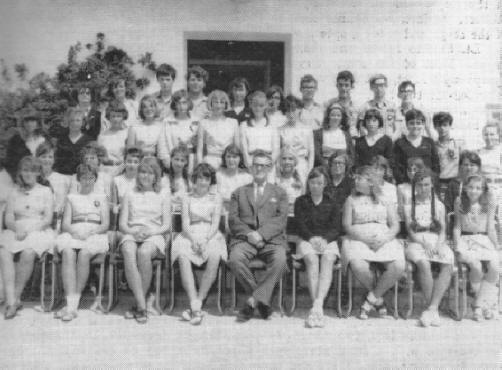 Mr.
Gerrard with the Senior Choir.
Mr.
Gerrard with the Senior Choir.
MUSIC
Another busy year has almost gone. A welcome to Miss Williams who replaces Mr. Wilkinson, and congratulations to her and the Junior Choir for a splendid Carol Service at the end of the Autumn term.
The Senior Choir acquitted itself well at the Annual Prize Day and "The Pirates" was well received. Lunch-time concerts proved again their popularity and also surprised us by the talent we have in School.
The School Concert is now taking shape and will involve almost 100 children. Every lunch-time one hears the sound of choirs, wind groups, jazz groups, and we are looking forward to the date, May 25th. Once again Trevor Jones will be our guest artist, and we look forward to hearing him again.
Concert ProgrammeWe say good-bye to Lyn Edmunds this term. She has given very freely her time in the many musical activities of the School, and we wish her success in her musical career at Bretton Hall.
MAESTRO.
THE MUSIC CONCERT
On the 2nd February this year the first and second year listened to a Royal Marine band in the hall. When the bell went, we all went to the hall. The boys sat in front, on the floor, the girl; in the seats behind. The stage had curtains drawn across and was furnished with music stands and chairs. Slowly, one by one, the band came and took their places. The first performance was by a small orchestra conducted by Lt. Shillito. The main part of the orchestra consisted of violinists who were on the left hand side of the stage. One of the staff, Mr. Witherspoon - - played the violin in the concert. At last, Lt. Shillito came in and Commander Coupe came to the front of the stage and made a speech welcoming him and the orchestra.
Lt. Shillito bowed and then he announced the title of the first piece of music. Most of the music was usual orchestral type. I enjoyed the "Toy Symphony" most, At first we noticed a movement on the stage. Lt. Shillito informed us the 'band were getting their toys. We expected them to come back with teddy bears etc. until he informed us they were toy trumpets etc. the band were getting. The actual music was light with the toys coming on their own at regular intervals.
When the string, orchestra left the stage, it's place was taken by an orchestra in which there were no violins - - they were replaced mainly by woodwind instruments. The music they played was lighter than the first orchestra's music. Lt. Shillito did not conduct this time - - he played a trumpet. I will mention two tunes they played... one was the music to "Thunderbird", the other was one I 'particularly liked, "Tricky Trombones". The rest of the tunes were some of those commonly played on park bandstands in Britain.
After the "Tricky Trombones" Lt. Shillito cried "Hey, Whats that?". Suddenly a terrific banging, booming noise came from the back of the hall. Many, including myself, thought the organ chamber at the back had fallen down. Presently, through the panicking audience, there appeared a basis drum over two brawny legs, two arms, one brandishing a drumstick, another poking the audience with a scout stave with a polythene bag on the end. As the drum, legs, arms, scout stave and drumstick came closer we espied a shortish man dressed in a Savoy scout troop uniform, forcing his way through the audience. It was not long before he reached the stage where Lt. Shillito said "I am very sorry at this interruptance but a big band like ours attracts a certain kind of idiot", which remark was greeted with laughter. The "scout" stayed and the band started a tune which showed the types of instruments used. A musician stands up and says "I am the music man from down your way and I play the trumpet" or whatever instrument he played. He then played it, and after his solo the band joined in. Then the next instrument was introduced and so on.
When all had finished they started some very Jazzy music - - which I did not particularly like - - including "The Yellow Submarine" which the audience sang.
I have only a few criticisms; I did not like the jazzy music at the end, I did not like sitting on the floor, and I thought the applause at the end was silly and stupid and carried on too long. Otherwise it was thoroughly good effort by the Royal Marines and we all enjoyed it very much.
HAIKU
A Hot day
The sun was shining Brightly down, Upon the grass And the bright flowers.
A mad rush galloping horses, Running deer And striped zebras Fleeing for their lives.
JUDY WALTERS 1A2.
LUNCH-TIME RECITALS
During the Christmas term there were two lunch-time concerts both of which were very popular.
Claire Barraclough, who has just came up from Verdala, played two pieces on the flute - - one being a lively polka. Mr. Tatton then sung a Neopolitan folk song which was followed by a clarinet solo by Christine Coupe, who played a folk song by Dvorak from "Songs my mother taught me".
Wendy Coupe then sung and played a Bob Dylan song "Blowin' in the Wind". Ian Stewart played "The Acrobat" on the trombone and the concert ended with three American folk songs by John Field and Brian Jackson. When they were joined by Wendy Coupe for their last song "Careless Love" it finished prematurely when Brian Jackson broke one of his guitar strings.
The next concert opened with a piano duet by two members of the music staff -- Mr. Gerrard and Miss Williams.
Penny Tatton sung two songs by Gilbert and Sullivan, after which Elizabeth Jameson played "Fleur de Lys" by Beethoven on the piano.
A few folk songs and the slow movement of Haydn's Trumpet Concerto were played on the trumpet by Robert Field.
R. IAN STEWART.
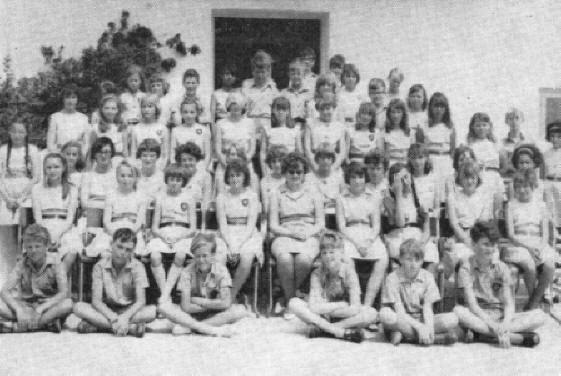
Miss Williams with the Junior Choir
Miss Yule and Instr. Cdr. Coupe with the School Prefects.
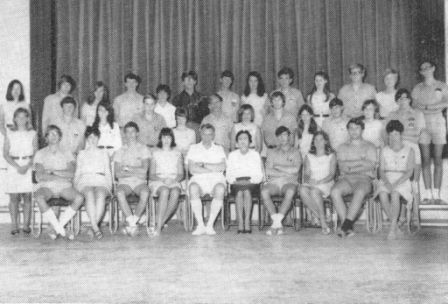
CHARITIES COMMITTEE REPORT 1966-67
The committee has worked quite hard this year. It was decided that the old method of collecting money each week was not satisfactory and a "once a term" policy was adopted. This was put into action during the spring term.
We made 2,000 flags and sold them in aid of the Leukemia research fund. The response was wonderful and ฃ125 was collected. ฃ25 was sent to Great Ormond Street Childrens' Hospital, London and ฃ100 was sent to the Alderhay Childrens' Hospital, Liverpool where -a great deal of research is being carried out. Letters of thanks have been received from these hospitals.
This term we are going to write and publish a magazine which we shall sell in school. The money collected will be sent to the Save the Children Fund in Great Britain.
At Christmas toys and books were collected for the World Community Chest which sends gifts to deprived children in Europe and elsewhere.
We would like to thank Mr. Moyle and all other members of staff, all parents and children who have assisted in any way.
WENDY COUPE Secretary.
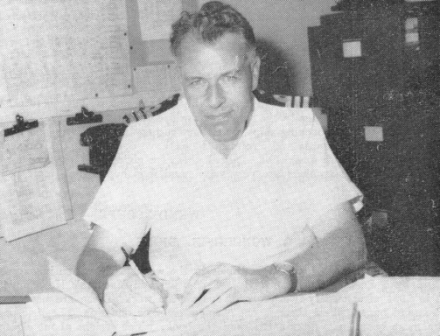
STAFF DEPARTURES
At the end of this term we shall be bidding farewell to no less than fourteen members of staff, viz: Miss Cater who joined us in September, 1960; Mr. Bowen, Mr. & Mrs. McGillivray and Mr. Smith (September, 1961); Mr. Paley (September, 1962); lnst. Lt, Cdr. Blackmore (August, 1963); Mr. Devine (September, 1963); Inst. Lt.. Cdr. Swift (October, 1963); Miss Lamb (September, 1964); Mr. Sheppard (October, 1964); Mrs. Hull (April, 1965); Mrs. Cross and Mrs. Parry (September, 1966).
As we go to press we have news that the following appointments have been confirmed: Mr. Bowen as Lecturer in Physical Education at Kingston-upon-Thames Polytechnic; Mr. & Mrs. McGillivray to the staffs of Secondary Schools in Bermuda, and Mr. Paley as Head of Modern Languages Department at Thornhill School, Sunderland, Co. Durham. Instructor Commander G. Coupe, M.A., Deputy Headmaster.
Lt. Cdr, Blackmore and Lt. Cdr. Swift take up appointments at H.M.S. Drake and H.M.S. Mercury respectively and Mr. Sheppard, the School Bursar, to a Civil Service posting in the Portsmouth area.
Departures during the year included Mrs. Cockwill and Mrs. Cronin on the teaching staff and Mrs. Coupe, who was School Medical Sister for some time at Tal Handaq.
We wish them all health and happiness in their new posts and trust that we hear from them from time to time with news of the educational world outside Malta,
C.V.M
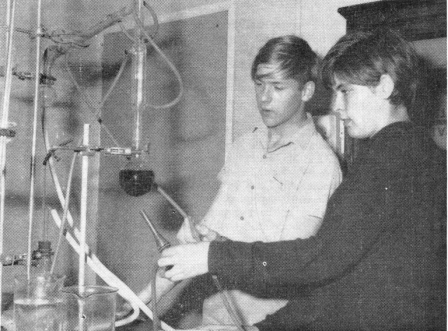
Wendy Coupe & JohnCarter distilling a heavy oil under reduced pressure.
SCIENCE SOCIETY REPORT 1966-67
The Science Society has had many interesting and amusing lectures this year.
Many of the meetings, although scientific, are not serious lectures, but talks given about science in the practical world e.g. Forensic science. We have also had talks about docking ships, veterinary surgery, biochemistry and several films. Professor Edwards and Professor Lewis have come from the University several times and we would like to thank them for giving up the;r time for us.
The Society's numbers are very small and it is hoped that more people will join next year.
WENDY COUPE Hon. Secretary.
A WONDERFUL BIBLE
One of the most remarkable Bibles in the world was written in exquisite hand by a Presbyterian named Russell who lived in Montreal. He completed it in 1924 after twenty-two years of spare time work. There are nearly two thousand pages, where there is not a single error ot omission. The title pages are most beautifully illuminated, and the book, which weighs about eighteen pounds, is bound in leather.
BERNARD MARSHALL 4th year.
3rd, 4th, YEAR LITERARY AND DEBATING SOCIETY
The year opened with a balloon debate, the inhabitants of the balloon being as follows:
Eccles, played by David Norris.
Frankenstein, played by Ewart Shaw.
Venus, played by Carol Eyeions.
Joan of Arc, played by Jennifer Williams.
Popeye, played by Robert Ross.
The winner by an overwhelming majority was David Norris whose lunatic wit has had a great influence on the Debating Society. This was the most popular debate of the term with an attendance of almost 65.
Miss Williams was the guest speaker at the debate 'Women Drivers should be Banned'. Miss Williams is a member of the Institute of Advanced Motoring and of course opposed the motion. Due to the high male population of the audience the motion was carried.
The Christmas debate was the Mock Trial of Santa Claus. Santa Clans (Ewart Shaw) was charged with corrupting the minds of young children. Although Santa Claus made many appeals for mercy and statements of innocence, he was found guilty. The result had been d.e'cided before-hand and so he had not got a chance. With his long blonde hair curling round his shoulders he was led off to a starvation diet on a desert island.
Another balloon debate was held with:
David Norris as Spike Milligan.
Ewart Shaw as Adam.
Dorothy Saunders as Billy Bunter.
Peggy Grey as Einstein.
Maureen Carberry as Beds.
Margaret Murphy as Walt Disney.
Anne Pomeroy as Bessie Bunter,
Due, no doubt, to the warped minds of the audience, the Beds won. Miss Yule and Captain Malkin attended this debate.
The verse speaking competition was open to all the first four years and was directed by Mr. Alexander.
The last 'thing' put on by the '3rd and 4th' was the 'Fogg Report'. This mad satire was tape recorded at Mr. Alexander's home, and was written by David Norris and Ewart Shaw.
The average attendance at these debates was almost treble that of last year, which is a tribute to the work of the committee. The committee fluctuated, due to the arrival and departure of the various members, but it can be summed up as:
Robert Ross, Chairman;
Ewart Shaw, Vice Chairman',
Margo Robinson, Secretary;
David Norris, Advertising;
Richard King
Nell Grace
and of course Mr. Alexander, without whose help it would not have been possible.
Thanks, too, must go to Miss Yule who regularly attended our meetings.
EWART SHAW
and MARGO ROBINSON.
PICASSO
Picasso in moods.
The blocks, the shapes, and the lines.
Passion, war, circus.
Picasso, how poor !
Freezing, scraping, finding grief
Searching the live mind.
Picasso finding fame
Selling, bustling, attic wild. ,.,
His tired mind is paid.
Curve rounded and full. Swaying, gliding, enclosing Twisting time and form.
Brush strokes for ever Create, apply the mind's way Movement, fulfillment.
SALLY RATHMELL L6A.
THE CAT
The cat is about now, In the bins she lurks, Ready for a piece of food Buried amidst the litter Looting for a crumb, As s'he sighs with hunger Eyes alert watching Her ribs drawn in Eyes suspicious Mouth open Starting, staring Hungry, hungry.
SUSAN DOLMAN - 2A1.
THE BEACH
A large, high, forbidding slope
Borders a long beach,
Deserted it stands, with its many friends
Azure blue, bejewelled water
Makes meandering channels in the sand,
Many coloured pebbles break the shore.
A. small crab scuttles on; unaware of staring eyes, Waterlogged bread is deposited on unblemished sand, Rotting fish stare ever skyward praying to the gods From upon their earthly altars of driftwood.
A solitary person breaks the landscape,
A small, but, well built lad,
With a deep dark complexion
And flaxen hair crowning his noble head.
From a distance he looks a sage from bygone days
Out of History's well trod path.
He frolics at the waters edge, Then tired, he sails down on the golden sands From where the watery juist within his reach Runs deftly up the silent beach, TONY ELLIS 3C1
HUNTED HUNTER
My legs were killing me, my .body ached but I dare not stop. Away behind me a horn cut through the morning air, blending with the baying of excited hounds. Soon, I'd be out of this forest and then there was open moorland, where the chance} of finding shelter were worse than hopeless. Should I risk running or try and hide ?
The hounds were very close behind me, I now knew of the hopelessness of trying to make a run for it. I wheeled to the right, scratching myself badly as I tore through a low thorn bush. My coat was ragged, covered in mud and leaves-. My heart threatened to burst but I forced myself on. Suddenly 1 remembered a rabbit warren I had once found, during one of my previous hunting trips. Perhaps there was shelter there - - the hounds were now less than a hundred yards behind me.
Emerging from the forest, I spotted a large burrow. Perhaps it was another fox's, too bad; it was my only chance of escape.
Scrambling in, I forced my way to the -bottom and froze, my ear; erect, straining to catch the slightest sound. Outside the hounds ran in confusion. The hunters cursed and wheeled about on their horses each other's orders.
I lay perfectly still, desperately trying to stop my heart from pounding so loudly. Why couldn't they find me ? Surely the hounds would easily pick up my '.scent ? Why it was a clear run from the forest to the rabbit warren -the rabbit warren ! That was it! Oh, if only I'd had the strength to cry out with happiness I would have done, for I'd now realise that my scent was blending in with the scent of the surrounding rabbits. All I had to do was wait, while those whisky-fired maniacs, so pompously dressed in their red coats, struggled to find me, and then... !
I tried desperately to remember how wonderful the taste of water really was !
PHILIP GILBODY.
TAORMINA - IN SICILY
Taormina is a Tourist centre.
Where people buy and sell.
Mount Etna is another place where you can go as well.
The streets are always crowded
Morning, night and day,
And as you wander through the streets you always have to pay:
Souvenirs are on sale everywhere you look
You could spend all day looking for an English book.
The Hotels here are very stylish
Depending on how dear
And im the evening when you dine the wine is there to cheer.
The money is spent and all is gone
For now the Holiday's over
So fasten your seat belts and fly away
Back to the White Cliffs of Dover.
JENNIFER BOYD 3B.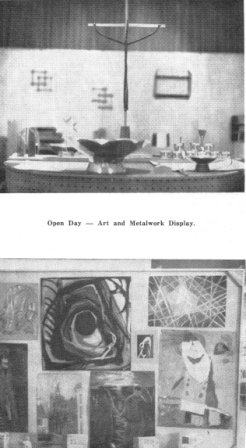
SNAKES
Snakes are among the most highly specialized of animals. They adapt themselves to their own way of life in any surroundings.
Most snakes have one lung only, because they breathe lightly. One breath is enough to last a snake for hours.
Humans have thirty-three, bones in their spinal column, snakes have over four-hundred.
Sometimes, although rarely, a snake can be born with two heads.
During winter, snakes hibernate for months until the warmer weather comes, acting on their senses, telling them to get up and look for food. Rattlers congregate in hundreds in what is known as a "Rattlesnake Den". All snakes shed their skins at least six times a year.
When getting their food snakes prefer to eat their prey head first, (1) because the fur or feathers start backwards, not sticking in the snakes throat. If the animal should wriggle the snakes teeth slant inwards so clasping the animal in a firmer grip and (2) the prey is suffocated more quickly.
In different parts of the United States there are several kinds of King Snake. Each one is immune to any other snake's poison. The spit-ting cobra does not bite but spits its deadly venom into the enemy's eyes, so blinding it. It is very accurate and sprays its venom with a force as far as eight feet.
There are seven main division of snakes:
- Boas and Pythons.
- Burrowing Snakes.
- Cobras and Coral Snakes.
- Common Snakes.
- Vipers.
- Pit Viper.
- Sea Snakes.
When first born each snake is enclosed in a clear sac of membrane. Rattlesnakes usually have four young, whereas a small garter snake can give birth to seventy young.
An anaconda can give birth to seventy-two live young, each over three feet long.
The female snake takes a lot of time and care in selecting her nest. She looks for a hollow under a stone. The stone must be thick enough so that when exposed to the sun's rays it must impart the right amount of heat to the eggs underneath. The ground must be soft and sl:ghtly damp, and very well drained so that the water will not accumulate under the stone.
After finding the
right stone, the snake will lay her eggs and go away, and
will probably never see the baby snakes.
A large rattle snake when excited or angry rattles it's tail. This sound can be heard for a hundred yards or more.
It is very difficult to measure a fully grown Python. At one year when . Python was to be measured it took welve men to hold the snake, and even then it could not be measured completely straight.
J. RUDLING 2A1.
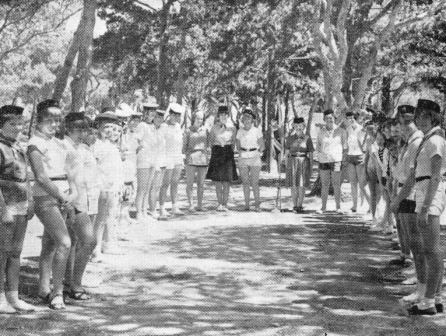
R.N. SCHOOL, GUIDE COMPANY
The school guide company started its new year last September and has since enrolled Kerrie Cunningham, Judy Walters, Julie Bosanquet, Katina Talks, Olwen Lane and Karen Norman. On 21st December a guides' Christmas Service took place at the Anglican Cathedral in Valletta. Olwen Lane was packed as guide reader (from Tal-Handaq) and some of our other guides were ushers. Gifts of food, toys, comics and some money were brought to the service for the poor children.
On the 23rd December we went from Customs House in the C-in-C's launch to Villa Portelli and made wreaths from the flowers in the villa gardens. The wreaths were then taken to the war graves of Commonwealth forces who died in Malta during the war.
Our guides, on 27th December, were at Verdala to represent Luqa area when Lady Martin inspected guides from Britain and Maltese companies. She was entertained by guides demonstrating various guide badges and then shown cooking on open fires. At this meeting we were unfortunately beaten by a very narrow margin in a treasure hunt.
On Thinking Day 22nd February, we had a lovely party in a hired hall, with running buffet, and celebrated Lord and Lady Baden Powell's Birthday's. At Easter another trip was made to the War Graves, this time with some visiting English Guiders.
At Easter we and Maltese guides camped for three days at Verdala. 4t this camp Evelyn Morgan passed her campers permit. The camp was very successful and we are looking forward .to our next one at Half Term, when ;t is hoped more guides will be able to attend.
On 23rd April we took part, with all other Guides and Scouts, in a St. George's Day Parade. After a Church service at Floriana Methodist Church we marched down Kingsway, past the Governor General who took the salute outside the Palace.
Luqa district sports were held at the Marsa on Saturday 20th May. Tal-Handaq guides were well represented, and won several events.
Mrs. T.S. Moyle the District Commissioner has visited the Company on several occasions and has been pleased with the standard of work which she has seen.
W.W.
THE PEKE
Peterkin dog is a Pekinese dog,
With ears all floppy and sloppy,
With a flat little nose
And funny wee toes
And a temper that no-one can copy.
Peterkin dog, the Pekingese dog,
Was taken along to the show,
He sat on a log
Next to a great dog
And proceeded to turn up his nose.
Peterkin dog, the Pekingese dog,
Was awarded a beautiful prize,
He told the big dog
Who sat on the log
Who said 't was an awful lie,
Peterkin dog, the Pekingese dog, Returned from the show that night, An eye nearly closed And a blow on the nose, The result of an awful fight.
Peterkin dog, the Pekingese dog, Is now by far more wise. He 'has learnt, to his cost Not to boast to the lost Although he had got the prize.
GILLIAN HARVEY 2Al.
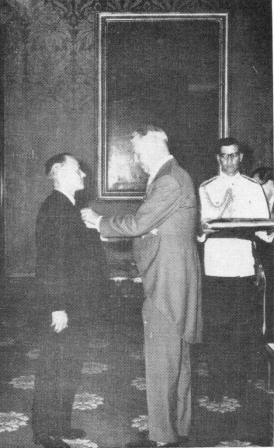
Mr. E. PLANT, B.E.M.
Our hearty congratulations to Mr. E. Plant, our School Warden, on the award of the British Empire Medal, which was presented to him by the Governor General at an Investiture at the Palace, Valletta, on 30th May, 1967.
SAILING
It's amazing how quickly these annual reports seem to come round!
Last September, at the beginning of the school year, the numbers in the fifth and sixth forms wishing to sail on Thursdays and also in the fourth form on Wednesdays, were many more than could be given a regular berth.
Qualified helms were scarce at this time also, and the number of dinghies available was a very uncertain and variable factor, especially on Wednesdays, but, as usual, the Garrison Sailing Club, The Fleet Recreation Officer and the Boats Officer H.M.S. St. Angelo have been very helpful. The school continues to be most grateful for these sources of sailing boats.
The numbers sailing fluctuated from a small nucleus of helmsman only to a large group of as many as thirty when all the variables of boats, numbers of helms and the weather were in our favour.
T
he poor weather has interfered considerably with the sailing programme - year and there has been less opportunity for regular sailing than 'n previous years.A number of boys are now junior members of the Garrison and R.A.F. Sailing clubs and make use of the facilities at Hay Wharf and Marsaxlokk. In fact G. Cunningham and P. Croome of the fourth year have been awarded their class "B" qualification from the Garrison S.C.
In the fifth and sixth years Alan Blue, Frank Brace and Wilson have their class "B" qualification from the R.A.F. and the following have a school helmsmans qualification: Elizabeth Jameson, Chris McCready, David Radford, Peter Hirst, Beryl George, Nicholas Woodley, Colin Millard. Well done, but how about more girls qualifying? The R.A.F. and Garrison Clubs offer good facilities to junior members so why not join if you can before you have to go to colder and more tidal waters ?
R.J. McGILLIVRAY.
GHOSTS?
I stretched out my arms and yawned. The train journey was rather tiring and boring. In my compartment there was only one passenger, an old and well-dressed man. He wore a grey and rather pointed beard with a matching moustache. The high cheek bones suggested something of Orientalism but there was no hint of slanted eyes. Owing to his turned-up coat collar and large hat, his features appeared shadowed and his complexion dark.
I decided to try and start a conversation.
"Will you smoke?" I asked.
He smiled slowly and courteously pointed to the "No Smoking" sign. I was so determined to start conversing now that I was completely unperplexed by this. I inquired about the contents of his morning paper. "The only interesting item", he replied slowly "is a report of a lady seeing the ghost of her Grandfather."
This amused me.
"I'm surprised that any intelligent person can believe in such rubbish," I retorted.
The gentleman regarded me coldly for a moment and then said:
"I believe in them."
This embarrassed me and I could feel my face redden.
"I -- I didn't mean anything personal," I stammered. The man smiled his acceptance of the apology.
I then asked him if he had ever seen such a phenomenon, to which he answered with a smile and a wink. Startled at this I remained silent for a while, deep in thought. "Could you tell me the name of the next station, please?" he asked. I replied that the next stop was Guildford.
"Ah, then I must leave soon," he remarked.
I looked down at my magazine for a few seconds, then, glancing at my watch, I looked up to tell my fellow passenger that we should be at Guildford in about two minutes. I was alone. With sudden realisation I smiled, he had probably gone to wash his hands. The smile then froze on my face it was a non-corridor train. I.Champ 5B
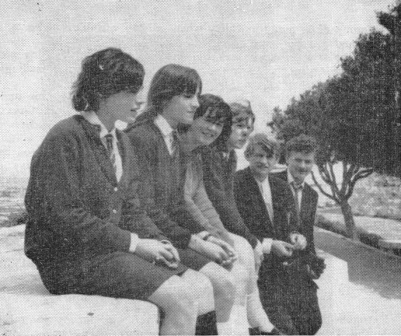 5th Year visit to Mdina
5th Year visit to Mdina
"DUNERA"
Life on board was very interesting and very busy. We were given lectures about our first stop Izmir and about the ship itself. In the evenings we either went to deck-dances or -the cinema, but all of us preferred the deck-dances. During our free periods away from our class-room called "Bacon", we -either went swimming, played table-tennis, wrote up our log-baaik and scrap-book or just lounged in the bright sunshine on the upper deck.
We ate three cooked meals a day, besides a supper. These meals were excellently prepared by a very friendly staff of Lascars. There was a tuck-shop in the recreation room where we could buy anything from soft drinks and sweets to souvenirs of the ship and rolls of films.
During our cruise we visited Izmir in Turkey, Beirut in Lebanon, Haifa in Israel, and Heraklion in Crete. The only place where the weather was bad was at Heraklion, It rained and was very cold. On our first day at Haifa, when we visited the Sea of Galilee and the surrounding countryside, the weather was very warm. This place will always be in my mind and in everybody else. I'm sure, because the scenery was so beautiful, especially when we climbed Mount Carmel at night and looked down on the Harbour and the lights of Haifa.
I have thoroughly enjoyed this cruise, and hope to go again on one, as I am sure everybody else does. The staff were exceptionally kind and helpful especially our Matron and the man in charge of our recreation.
MARION GREEN 4Q.
|
IN EGYPT The flowing breeze on my fevered 'brow, The joy and thrills of a life of dreams, The old garden where I played, Oh, how I beg and long for the sweetness of boyhood, But now none of these come to lessen my pain, And my heart is slowly eaten away. Here, under the heat of the sun with ne'er a tree to shade me, Nor anything to look at but the pyramids of Egypt's past, With ne'er a sweet breeze to cool my brow, With nothing to lighten my troubled thoughts Nor to make my numbed fingers touch, And I know life cannot win my soul. My lungs pant many a short breath, My eyes swollen, blinded, long for the sight of trees In Englands woodland glades; Sights never to be seen again, And in the black distance, The depths of hope, Fade slowly from my weakened grasp. A few panted breaths. A slower beat To my labouring heart And the pain of my fevered lungs Can hardly be felt. My heart grows weaker And the pulse of my poisoned blood slows, Till, out of the depths of darkness appears,
|
THE PIT Silence raging softly. Dust floating nervously. Chains "rust sitting with arms outstretched Coke spills elevated like marble Net hanging like -stringy clouds in profusion Bits of wood like memories jutting out The silent bar, bereaved bottles, Cave men drawings, stark and rude The emptyness of people remains still Nothing moves except you. Memories, oh memories 'Phoebe' written at the top 'Tiny' in bold blackness down the cellar 'Hele', her strokes immoveable. Paint pots and old rags, screws and hammers, Brooms, 'brushes, cloths, All glued to the ground, untouchable. The ones who have left are here with you Only in the hour when you are there alone. Plopping of steps are heard, Louder and louder, head bent Someone enters, they appear to stop Only the darkness deceives you. Tranquillity is ruined. Crates rattle String clouds move with the gusts. Voices ring and echo. Guitars are strung up and strung down Giggles emerge from the cloakroom Smoke rises inhaled by the atmosphere Purple and green, colours distorted. Noise and clanking bottles. The group begins, shyness dissolves, The walls are with us and glow. Bodies writhe and glint in the light Vibration of ground, vibration of body. Everything vibrates, even the mind. Chatter and smoke, smoke and chatter Handbags and coats, money and shoes, Everything moves, movement is everything. The Pit is "The Pit" once more. SALLY RATHMELL L6A.
|
|
DEATH. Feebly I fight To loosen his grasp, I cry out weakened cries, I fret, I pray, But 'tis too late, To dislodge his bony hands' from my dying frame, All1 hope has gone, My life is borne away Till I am aware no more Of the fire of guns about me. LESLIE BURTON 2Al.
|
THE DOG The dog is black or white or brown, And sometimes spotted like a clown, He loves to make a foolish noise, That Human Company enjoys. The At Human jokes, however stale, He jumps about and wags his tail, And Human People clap their hands And think he really understands. They say "good dog" to him To us they say "poor puss" and make no fuss, Why dogs are "good" and cats are "poor", I fail to understand, I'm sure. To someone very good and just, Who has proved worthy of her trust, A cat will sometimes condescend -"The dog is everybody's friend."
JANET CLARKSON 1C1.
|
THE ART OF WRITING
To write, poetry or prose, serious or humorous, short or long, fictitious or factual, epic or ess-ay, one must have that essential quality that is present in every great literary figure imagination. Genius is based on this one factor in the constitution of man -- without it genuine greatness in the field of arts is impossible.
For instance, when one is writing a novel be it science fiction, spy thriller, or domestic life the first necessity is an idea on which to base the story. This idea must come from somewhere; some writers use ideas that they have taken from others, but most are original a story similar to one that the public has read before will not have a very great appeal.
In the first case, then, we will imagine an author who has taken the idea for a story from a book he has already read. He decides to write a novel on the same lines. But he has to have imagination to build a new story around the same idea, to disguise the fact, however slightly, that he is 'borrowing' from the work of someone else.
In the case of the author whose idea is original where did it come from ? It appeared because of the working of his imagination. He brings to life in his mind a fictitious picture. He enlarges it, fixes it more clearly, and begins to set down on paper his idea, and in the end, his completed story.
Someone who writes a biography or an autobiography already has his idea, his material; everything seems to be there, waiting to be set down cm paper. But one essential is lacking. Imagination. If the author-to-be has none, his book will reflect this: stodgy, unimaginative, dull. And consequently, not very successful.
Writing is something that cannot be done without imagination. A person who is very imaginative may be a genius: a person who is a genius is very imaginative.
Unfortunately, I am not very imaginative. Nor am I a genius. That is why I am not writing anything for the school magazine.
A. SIDDALL (Lower 6 Arts)
| The Cape of Storms The ropes hang stiff and damp The spans creak and drip water, The sails hang drooping and sad, Wreaths of mist float across the bows, As the galleons roll on the icy swell. The sun glassily thaws through the mist. And the sea is almost calm. In a silence so still Forgotten voices whisper and moan And hushed noises float across the water From the land, Which shows a little through the mist. Rocky crags wait like the cruel fangs of the lord Eager, sinister and waiting For the inevitable storm That will dash the galleons onto the rocks. |
The remorsless tide Drags the fleet round the point Where a whale spouts a glittering fountain of water A fountain from the black silhouette Of a living island. Hopelessly the fleet is dragged, Helpless and deserted, Waiting for the next violent tussle With the storm they know wild come. This, is the Cape of Storms, Telling tales of monsters, storm and suffering, Where between each storm There is an icy calm Neutrality, Expectant in the cold light of dawn. The fleet sails on. JANET MORLEY 3A
|
MOONLIGHT PICNIC
Last year my family and friends decided on a moonlight picnic. It was a lovely evening being a full moon. As it was the month of August it was very hot.
We left home at half past seven and reached Golden Bay after a lovely drive.
Leaving the adults to unpack, we youngsters raced to the water, and had a fabulous time splashing about in the water. My cousin brought a ball, but as it grew dark we 'couldn't see it and that was the end of the ball. We lost it.
About an hour later our parents came and spoiled the fun by telling us to come out of the sea. Once out of the water we discovered how cold it was getting and we changed quickly into our clothes.
When we got dressed, naturally we had to do the heavy work, like bringing the drinks from the bar, but we were so glad when we came back finding hot dogs, hamburgers, sandwiches and cakes.
After a quarter of an hour everything was eaten and we settled down round the fire drinking, singing and dancing. We were put in teams of two and we took it in turns to sing and dance. I had brought my guitar for my cousin and myself to play and it was a great help to keep the singers in tune.
My uncle, who is a comedian, told such good jokes that we split our sides with laughter.
The time passed so quickly that it was twelve o'clock before we packed up.
The drive back home was cheerful and gay as we were very happy to have such a treat and we all hope to do it again this year.
LYNN EDER IB.
AN ANCIENT CUSTOM OF BRITAIN:
THE "ANCIENT SILVER ARROW" CONTEST
This contest is claimed to be the oldest sporting contest in Britain, in which 250 contestants shoot for the "Ancient Silver Arrow". It is held every August at Scorton, east of Richmond, Yorkshire. Archers must be over twenty-one, and shoot at a hundred yard range, two arrows from each end. The first to register a hit in the Inner Gold of the target wins the arrow and becomes Captain for the next year. The "Booby Prize" is the "Ancient Horn Spoon". On the same day a contest is opened to archers born or residing in Yorkshire for the "Thirsk Bowmen's Insignia".
BERNARD MARSHALL 4th year.
OLD WORLD FOOTBALL
Olympus B.C. 150
This year at Olympus the annual match was a particularly good one. Both the Wanderers and the Olympians had strong teams, and on the whole it was a good, clean game. Early in the first half Cheiron, centaur-forward for the Olympians, scored with a kick like a horse. The pass came from left winger Euclid who was playing a very constructive game. The ball went straight to the opposite end and Achilles almost had it in the net. But a well-timed thunderbolt from goal-keeper Jupiter saved for the Wanderers. In another attempt Achilles collided with Atlas, that man mountain, and had to receive treatment for a sore heel. Near the end of the first half Odysseus tricked the defence by hanging on to the referee's legs and scored the equaliser.
Refreshed by Pan's piping hot soup the teams came out after half-time. Electra continued to put a spark of life into the game, giving Orion (who was hunt;ng for a chance) the ball but she shot wide. The game ended when Perseus produced the Gorgon's head, from under his shirt. A stony silence tell on all and the annual match was over. IAN BROWN 3A.
CYPRUS
Cyprus, like Malta, is an island situated in the Mediterranean, but is very different in other ways. Cyprus is a bigger island with a more varied landscape and climate. There are two mountain ranges. Troodos Range has its highest peak, Mount Olympus, in the region of 6,000 ft. In the winter these mountains are covered in snow, and Mount Olympus provides an effective ski-run. The Kyrenia Range is much lower, only reaching about 2,000 ft. and although -t does not possess any ski-runs, it is dotted here and there with ruined castles, a reminder of Cyprus's interesting history. The most famous St. Hilarion -was given by Richard the Lionheart to his queen. It is built high up in the range, with sheer drops on three sides and a narrow winding road leading to it.
Cyprus is inhabited by Greeks and Turks. Luckily when I was there, there was peace between them. I lived in Nicosia the capital, which is roughly 'n the middle of the island.
There are many beaches around the island, these are all sandy. In my opinion the most beautiful beaches are to be found on the 'pan-handle'. This is the uninhabited west point of Cyprus. Here they stretch for miles. In fact all you can see around is whitish sand, blue sea and clumps of trees.
In the summer the weather, like Malta, is very hot. But fortunately one can go up into the mountains to escape it.
There was always a lot to do in Cyprus -- various places to visit and beautiful stretches of beach to laze on. I thoroughly enjoyed my stay in Cyprus and hope one day, to return there again.
JULIE SANDHURST 2A1.
PYRAMIDS
The first PYRAMID was built by having a huge square tomb and putting smaller tombs on top. When finished there were six tombs made to look like huge steps so it was called the step or terraced Pyramid.
About a century later in 2,900 B.C. the most famous of the Pyramids called the Great Pyramid was erected. It was built for King Kufu. The Pyramid occupies an area of thirteen acres. It has more than 2,000,000 blocks of limestone and granite each weighing about 2j tons. Each side is 755 feet long and 500 ft. high. It took 100,000 men 20 years to built it.
Pyramids were built for the dead Kings and Queens. They put riches, water and food in the tombs beside the Dead.
The Pyramids were erected between 3,000 B.C. to 2,500 B.C.
STEPHEN NORMAN 1A1.
COLLECTING BULLETS AND SHELL CASES
One of my hobbles is collecting bullets and shell cases. I first got interested in this sort of thing when about three years ago a friend of mine asked me if I wanted some shell cases. I gladly accepted them and used them as the beginning of a collection.
My present collection consists of four 20 m.m. shell cases, two .5 cases, six .303 rifle shell cases, two .303 blanks, one 9 m.m. shell case and about a dozen shell cases that I have not yet identified.
Also in my collection I have about fourteen bullets which consist of four .303 bullets, five 9 m.m. revolver cases and five that I cannot identify.
SIDNEY STOREY 1A1
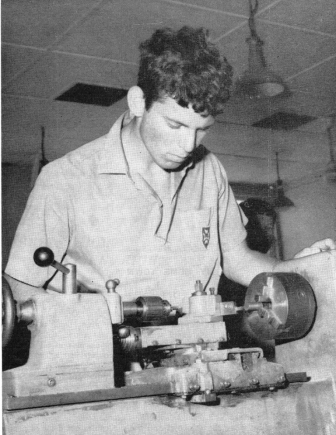
T Briggs in the Metalwork Shop
SHADOWS IN THE NIGHT
Up one wall, Down another, Leaping one way, Now the other.
Across the ceiling Now they flicker, There's a policeman, Here'3 the vicar.
How much longer
Will they jump around,
Making faces,
And stamping on the ground ?
First they're near, Now they're far, They've clothed the wall With one big scar.
Will they never go ? Will they ever stay ? Sleep is far While here they play. SUSAN EVANS 4S
A JUMBLE SALE
Old tea sets, Cricket bats, Fishing nets, Coats and hats Are what you find in a jumble sale.
Toys and dolls, Pots and pans, Old beach balls, Drinking cans Are what you find in a jumble sale.
Broken glass, Gloves and Scarves, Tarnished brass, Books in hail! Are what you find in a jumble sale.
Toy train rails, Rusty nails, Boats with sails, Spades and Pails Are what you find in a jumble sale.
THREE B
MY HOME TOWN
Vancouver, the third largest city in Canada, and situated on the west coast, is the city I call home. It's a beautiful place with the majestic mountains towering over the modern, new skyscrapers and the Pacific Ocean.
A very famous spot in Vancouver placed among giant Douglas firs and cedars is Stanley Park. The last time I went there was about six years ago before we went up north to Fort St. John. There are animals of all kinds in the park zoo. Penguins, polar bears, monkeys and swans are just a few. There's a very modern acquarium and also all kinds of rides including a miniature railway; and, no one must leave without seeing some Indian totem-poles. Something else to be^found in the park is a rock carved in memory of the Indian poet, Pauline Johnson. She spent the last years of her life in Vancouver.
Another place of interest is Vancouver's Chinatown which is the second largest in North America. You should taste the Chinese food!
It rains a lot but when the rainbows and the sun comes out a lot of people crowd on to the beaches. There are a lot of beaches around the city and up the Sunshine Coast. The tide is also very strong. At Spanish Cove it is known to go out one and a half miles.
All these things and many more make me hope I'll make my home in Vancouver one day.
DORIAN CHURCH 1A1.
|
|
THE STRAY Slinking through deserted dustbins By the old railway track, On past silent houses Through the foggy streets, Over the scrapyard wall To his home amongst the tin. Thin, His hair matted black With grime, He shivers. His bloodshot eyes look for food, He scratches in the gutter But nothing is there, He is hungry, But nobody cares. Over a garden wall he sees Bread, left for the (birds, But from a kennel under a tree A watchdog growls. Hunger gives him courage, He leaps down from the wall, He pads forward Stomach trailing ground. He leaps forward And snatches a bit of food, Then his neck is caught between teeth And shaken, shaken, shaken, He manages a little whimper. A torch light moves nearer, Voices move nearer, Hands lift him, The rug is warm And someone, Cares. LESLEY BURTON 2Al. THE FLY Buzz ! Buzz ! Buzz ! Another fly, I sit reading. When ruddy disturbed by thee, Buzz ! Buzz ! Buzz ! Yet another fly. It is gone, I sigh with relief But, It's back again. It has landed on my arm. I flick it away impatiently, My temper has* broken. I slap at it, Throw up my arms in despair, I crash my book down And wave my arms Stalk out of the room determined, To return with the fly spray, At last, Silence. SUSAN DOLMAN 2A1
|
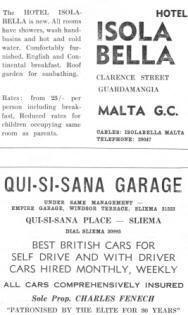 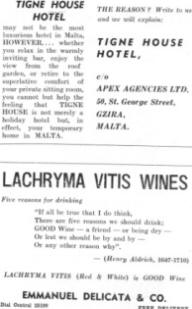 |
AUTUMN Autumn; the saddest time of the year. When Nature's beauty dies And withers, to be replaced With an icy hard coat. A time when leaves die and shrivel, Old and yellowed Like decaying parchments That have no further use. A time when winds terrorize The earth and bend and Break all within their power. A time for sighing, That the gay months oof summer Are over. A time for memories; When the east wind blowฎ And howl's round the house, And the red fire glows; Of warm summer days gone by; Of warm summer days that are dead. MARGO ROBINSON 4Q
|
SIXPENCE
She carefully hopped from one stone to a dry patch. Her cheeks were thin and drawn. She bent down and pulled on her shoe tighter. Her shoes were old and covered a very small part of her foot. Over her arm she carried a small basket with a few tiny bedraggled posies, nestling in a corner.
"Buy a pretty posy, ma'am" she pleaded to a woman passer-by. But she was pushed aside and the flowers fell into the cold slush.
She gasped, the poor things lying there on the pavement. She bent to pick them up and, she noticed a sixpenny-piece, glistening on the snow. She picked up her flowers tenderly and cautiously slipped the money into her pocket.
She could buy something now. A chocolate bar perhaps, or some liquorice. She held the coin in the palm of her hand, tightly, and gazed excitedly into the nearest shop window.
A bakery. It was cold outside, the wind bit against her skin. The warmth from the freshly cooked bread, could be felt coming from under the door. At that moment the assistant came to the window with a tray full of buns. She set them out neatly and the flower-girl looked at their shiny, golden faces. Globules of icing sugar had run onto the tray.
The flower-girl went into the shop and the warmth flooded round her. She bought two buns and went out of the shop clutching the white paper bag firmly.
She wanted to eat them alone, so she ran down the street to a small alley way. Here she sat down and opened the bag. The aroma was delicious. She
gingerly took out one bun and sank her teeth into it Lovely, warm
and satisfying. In four bites it was gone. She ate the second more slowly but it too, quickly disappeared,.
The wind seemed to get colder. It raged around her, knocking and hammering at her. She drew her thin coat around her tighter but it gave her no warmth. She lay down and closed her eyes. Sleep. Sleep was warm and comforting. She drifted into sleep. She slept forever.
SUSAN EDWARDS 3A.
DEATH AT MIDNIGHT
The stillness of the night was unreal, like a dream. The bright new moon cast shadows of the trees across the small patch of grassland. The sound of 'he crickets and the hooting of the owl as it guarded the forest from it's perch was all that broke the silence.
Suddenly, in the still darkness, a rustling sound could be heard as it a gust of wind was passing through the tree-tops, or a mouse was running over a straw-path. The crickets silenced and the owl stiffened on its perch. The rustling stopped, paused, and started again. A tiny creature scurried through the grass.
Up in the tree the owl's perch was no
longer occupied. A dark silhouette flitted across the moon. The tiny
creature in the grass stopped in its tracks as the huge silhouette
fell out of the sky in its direction. It had become yet another
victim of prey for the owl.
ANON 3B.
THE NORFOLK BROADS
The Norfolk Broads are really man-made lakes because they were originally pits from which peat was extracted. Then the whole area was flooded and when the waters subsided the Broads were left.
Now the Norfolk Broads are a popular holiday resort, especially for London business men. They are situated in the middle of Norfolk, mainly around the villages of Wroxham and Cottishall. Cottishall is a small, quiet village with old cottages and few modern shops but parts of it are very beautiful.
Wroxham is a real tourist centre, as it has large shops, a lot selling souvenirs and postcards. In the summer there are twice daily trips round the Broads in big open launches. 'Smaller boats can be hired for a week or more and they cruise along stopping at small villages on the way.
A much visited place is Horning Ferry. Here there is a beautiful inn, called "The Ferry Inn". It has a thatched roof (that once burnt down and had to be rebuilt again) and is built in tudor style. There is a large garden attached and here there are tables and chairs scattered about.
Going further up the Broads there is the Potter-Heigham which is a great place to watch the boats go by. There is a big bridge from which can be seen all the yachts and cruisers passing by.
There is a lot of wild life on the Broads especially the birds. Little islands are scattered about and on these many birds nest. People often fish in the waters as some quite big catches have been made. Not many people swim, though, because the water is dirty and rather unhealthy.
A holiday on the Norfolk Broads can be very interesting. But not for me it costs at least ฃ70.
S. ETHERIDGE 2A1.
BERLIN
Of all the interesting cities I have been .to I have chosen Berlin to write about as I think that not many of you have been there.
Berlin is situated in East Germany, right in the heart of Communist territory, and before the last war which divided Germany into two zones, Berlin was its capital city. The western part of Berlin is always the happier side but the Eastern side seems to have a cloud of gloom cast over it. The shops in the Western Zone are fully stocked and attractively displayed, whereas those on the Eastern Zone seem to have little to sell and look shabby and uncared for.
There are many wonderful buildings and monuments in Berlin. Perhaps the most famous is the Brandenburg Gate which stands on the border between the East and West Zones. The galloping horses which stand at the top of this monument (in stone, of course) originally faced West but the Russians turned them to face East.
I lived very near to the Olympic Stadium and have often seen Military Parades in it, including the famous tattoo.
Berlin had a lovely climate, very hot in summer, but cold and dry in Winter, and everybody who lived there looked healthy and fit.
CYNTHIA MOTT 1A1.
HAIKU
The Japanese gentleman who could not produce a Haiku at the drop of a cherry blossom, was not likely to be invited back to another moon watching party.
Why was Haiku so important ? A Haiku is a Japanese form of poetry consisting of seventeen syllables in three lines. The lines are arranged in the order of five, seven and five syllables. Haiku was not only an aural art, Haikai (the plural) were painted on scrolls with an illustration often referring to the poem.
The Japanese of the prewar and to the lesser extent the postwar period were very interested in this type of art. Each Japanese child could produce a Kakemono to hang in the tokonoma /hanging scroll to hang in the wall recess/ and an inability to do so was tantamount to Hara-kiri, except that Hara-kiri was an honourable way out and more preferable than social ostracism.
The most favourite subjects for Haikai writers were and still are, cherry blossom, almond blossom, clouds the moon and Mt. Fujijama.
A typical Haiku on cherry blossom could be;
Cherry blossom floats Slowly to the earth below Winter is coming,
or on the moon;
Slowly through the clouds Like a boat on a blue lake Sails the snow white moon.
Haiku has long been a work of art in Japan Europe as these examples show.
and is now catching on in
EWART SHAW 4P.
THE TOMB
Slowly our eyes get used to the dark, And shapes form in the dim, The guards 'by the tomb And he lies within.
Osiris guards the door,
And nobody can enter,
The lifesize ebony guards,
Once in life could prevent them,
And his boat lies there
Waiting as it has for millions of years
To take him to the heaven he believed in
And his riches surround him, And his coffin in splendour.
The gold wood is perfect,
The tomb has sealed the dust away.
The coffin draws us near,
Bait the guards prevent us
Our unwilling feet tread, the stone floor,
And though we know this is wrong,
We lift the coffin,
And he lies within.
He lies deep in entranced sleep, Ate he has for millions of years, And we let him rest in peace, A king, in the valley of Kings, And Osiris still guards the door, And nobody can enter. L. BURTON 2A1
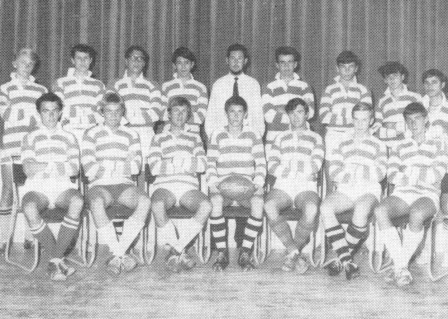
1st Rugby XV.
RUGBY REPORT
The past season has been one of varied performances, with places keenly contested in both 15 and 7 a-side; teams. The outstanding result of the year was undoubtedly our 350 win against the exiles, when our superior strength and fitness outweighed the greater experience of the opposition. But in view of the fact that the majority of our games were against adult service sides, our record is quite presentable. Played 10; won 5; lost 5. Points for -83; and points against 118 (the greater points deficit is largely due to the 550 defeat inflicted by a strong and keen Nomads 1st XV, on a much weakened school XV.
The half-back combination of R. Field and A. Tagliaferro improved their standard of play, and in addition produced a greater understanding between themselves as the season progressed; providing an efficient service for centres K. Lawrence and B. Jackson. A feature of our three-quarter play was the accurate kicking of K. Lawrence, both in attack and defence where long, diagonal kicks presented wingers Rule and Nicholas with scoring chances. Since the majority of oust fixtures were against adult sides, we experienced disadvantages in size, weight and experience which necessitated a high standard of fitness. Thus there was a period of pre-season training with the emphasis on stamina, allowing more of the playing season to be devoted to the development of skills.
As a result of this training a team spirit was cemented very early in the season especially in the forwards who, ably led by N. Vaughan worked hard as a pack. It is difficult to single out individuals but I feel that four should be mentioned because of their consistent effort throughout the season: Carter and Willett for their defensive tackling and binding in the loose play; and Leeman for his season as a destructive wing-forward. Although Crimson eventually settled at blind-side wing-forward, he played competent games at scrum-half and wing three-quarter.
Finally I would like to thank Mr. Jackson on behalf of the team for organizing matches and training sessions, and for his support throughout the season.
New Colours: Wilde, Willett, Rule, Carter and Tagliaferro. Old Colours: Jackson, Lawrence and Vaughan
. Results:
School v. Hawks 615
,, v. Nomads 055
,, v. Hawks 9 6
,, v. Anglians 25 0
,, v. Exiles 13 6
,, v. Exiles 35 0
,, v. Mr. Jackson's XV 1121
,, v. Luqa 915
,, v. Comcen 12 0
,, v. Hawks 615
B.C. JACKSON (Captain).
Inter-Service7-a-side Tournament
The school entered two sides in the seven-a-side tournament with the following results:
Tal-Handaq 'A' 20 pts. H.M.S. Dainty 'A' 0 pts.
Tal-Handaq 'A' 5 pts .Hawks 'A' 11 pts.
Tal-Handaq 'B' 0 pts R.A.F. Luqa 9 pts.
Tal-Handaq 'B' 0 pts
Anglians 'B' 9 pts.B.C. JACKSON (Captain).
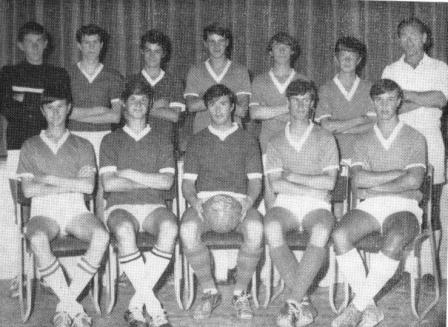 1st Soccer XI
1st Soccer XI
SOCCER
In October the Inter-Services Soccer Committee admitted the Tal-H andaq Senior XI to Division ha of their League competitions.
So began, for the first time, a season of competitive League football against adult Service sides several of whom (4th R. Anglians "B" and R.A.F. Luqa "B" etc.) were able to field teams of experienced players.
The team settled down quickly to its new formation and in many of the early matches kept play well in the opponent's half, but with little to show for this advantage. The loss of Fleming (to U.K.) and Bayly (injured) forced changes, but with the defensive system gaining in confidence and with the "strikers" finding a goal-touch, results and performances improved.
Hard earned draws against St. Angelo (League champions) and U.K Civilians were followed by close games against R.A.F. Luqa, and the final collection of sufficient points to finish 5th and clear of the "relegation" zone.
In summarising the League season it is obvious that the School players have acquired considerable soccer experience and the results of this could be seen in their latter games. Our friendly relations with the Services have extended and improved, and they have been kind enough to praise, on many occasions, the standard of soccer played by our team.
In modern football with teams emerging as complete units, it is increasinglydifficult to select individuals for mention. But certainly the defensive quartet of Halliday, Lawrence (Capt.), Spafford (The Rock) and T. Mattingly deserve praise, as must the midfield artistry of Steven Spence. The "strikers" R. Aldworth and Donaldson have shot and headed more than 50 goals between them during the season, while good all-round support has been given by M. Cannon and excellent goalkeeping displayed by Howard.
Including "friendlies" some 25 matches were played during the season which was the most challenging and interesting one so far. I would like to congratulate all the boys who represented the School during the season.
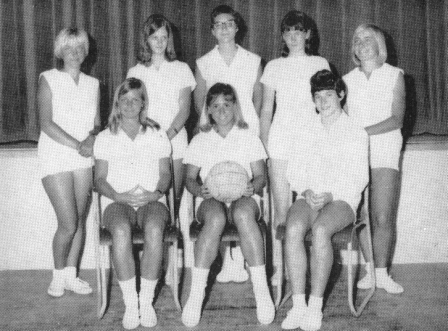
1st Netball VII.
NETBALL 1966-1967
The school netball team had had an excellent season this year, not losing any of its matches. Although we lost a very good shooter and midfield player, Robina Hopkinson, half way through the year, her place was filled by Janet Saddler, who settled down very quickly in the team after only one practice and game.
Good netball was played throughout all the matches and a notable style has definitely developed in the game, the players working completely as a team. Several members of the team will still be here next year and these should provide a strong foundation for next year's School VII.
The team would like to thank Mrs. McGillivray for arranging all our fixtures, and without whose help and encouragement this would not have been such a successful year. Results:
Played 7 Won 6 Lost 0 Drawn 1 For 112 Against 93
The team was comprised of the following girls: GS J. Saddler GA P. Elliot, R. Hopkinson WA S. Rathmell C G. Hamley WD P. Goodfellow GD J. Mogridge, A. Elliot GK G. Witherspoon
Colours were presented to: P. Goodfellow, G. Witherspoon. Old Colours: S. Rathmell, G. Hamley.
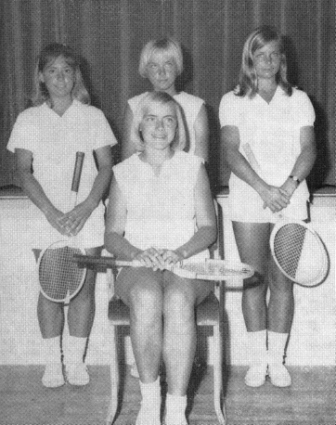
1st Team which played in the Joint Services Ladies League.
TENNIS
Of all the Games taught in a School Tennis ig probably the most useful because it is the one most likely to be continued in adult life where it has the value of being a social asset as well as a form of recreation and exercise.
Since the completion of three new Tennis courts on the school premises it has been possible to concentrate rather more on this game and two features during the year have done much to foster enthusiasm throughout the school.
The first of these was a weekly visit to the school by Mr. Gordon Mudge, the British professional coach and player, during his stay in Malta. Every girl in the school had the opportunity to see Mr. Mudge coach the more promising girls from her own year group and then to watch a demonstration singles match between Mr. Mudge and Mrs Diane Stevens (herself a former county player). We should like to thank Mrs. Stevens for giving up her time to play these matches and so enable the girls to watch first class Tennis played by two stylish and expert players.
The second venture was. the entering of a girls team in the Joint Services Tennis League. All the teams in this league are composed entirely of adults so the girls faced players of infinitely greater experience every time they played a formidable undertaking.
It is greatly to their credit that all their opponents praised tooth their play and their conduct in these matches and they are to be congratulated on the determination and perseverance that led to the winning of their final match and to the marked improvement made during the season.
P.Mc.G.
TENNIS REPORT
The school team would like to thank Mrs. McGillivray for organising us and entering us in the Inter-Services league.
As a new school venture tennis has been enthusiastically received by the girls. Although the team only won one match in the league, we all enjoyed playing and learnt a great deal about competitive tennis.
The girls representing the Tal-Handaq
ladies in the Inter-Services league were: 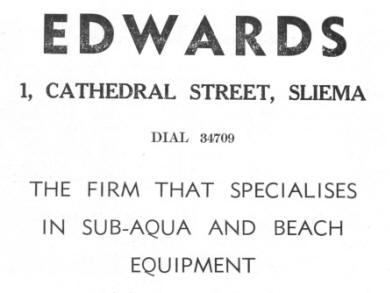
P. Elliot and A. Elliot.
G. Hamley and S. Rathmell.
PATRICIA ELLIOT (Tennis Captain).
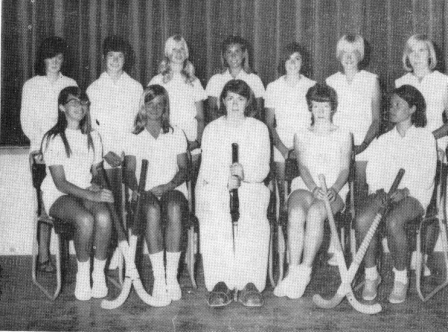
School 1st Hockey XI.
SCHOOL HOCKEY REPORT 1966-1967
This season has been very successful, the 1st XI winning all the matches played. Although the team has frequently consisted of reserves with a few regulars, good hockey has been played throughout the season.
We were very sorry to lose our captain, Robina Hopkinson, in November; her absence has been felt but it encouraged us to work even harder on the pitch. Special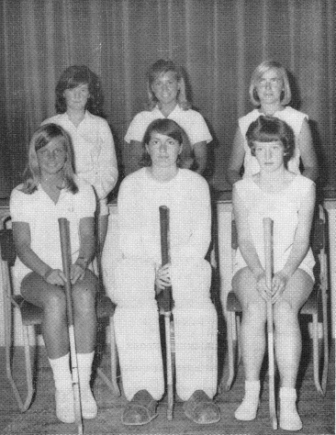 mention
must be made of Gayner Hamley, Angela Radley and Pat Elliot who formed
the basis of the team. However the climax of the
season was undoubtedly the 'A' team winning the six-a-side tournament at
Corradino just before the close of the season. The 'B' team also
did well, coming third. The winning team consisted of:
Angela Radley Pat Elliot Sadie Lendrum Penny Tatton.
mention
must be made of Gayner Hamley, Angela Radley and Pat Elliot who formed
the basis of the team. However the climax of the
season was undoubtedly the 'A' team winning the six-a-side tournament at
Corradino just before the close of the season. The 'B' team also
did well, coming third. The winning team consisted of:
Angela Radley Pat Elliot Sadie Lendrum Penny Tatton.
Hockey Tournament Results: 1st VI versus R.N. Nurses drew 1 -1
versus 4th R. Anglians won 3 - 1
versus W.R.N.S. won 2 - 1
versus School 2nd won 3 - 0
versus Minesweepers won 6 - 0The school team consisted of
GK P. Tatton LB A. Eichman RB J. Cross LH A. Radley CH P. Elliot
Others who played - R.Hopkinson, M.Crombie, M.Jones, S.Boyd, C.Ashcroft, C.Pike, A.Kilpatrick, R.Fisher, C.Drane.
Results for the season: 1st XI Played 5 Won5 Lost0 Drawn0 For22 Agst.1
Colours Retained by: Gaynor Hamley. Angela Radley. Sally Rathmell (Captain).Colours Awarded to:- Pat Elliot. Alicia Eichman. "A"Team Winners of Services Six-A-Side Hockey Tournament.
Finally, I would like to thank Miss Melling for arranging the matches and for all the help and encouragement she has given us throughout the season.
SALLY RATHMELL (Captain).
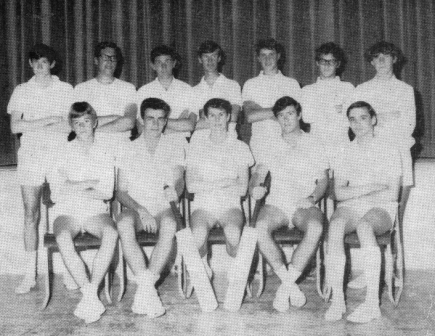 1st
Cricket XI
1st
Cricket XI
CRICKET REPORT
Last years first XI met with a reasonable amount of success, finishing fifth in the Naval League.
Although there was keen enthusiasm throughout the season, the success tended to rest mainly on the shoulders of a few players. The mainstay of the batting element were Spence and Potts, with Hopkinson and Smith both contributing some valuable innings. However, the team were fortunate, in that, it incorporated a variety of skilled and talented bowlers. Spence, Cannon, Dugmore and Scott deserve special mention for their consistantly accurate bowling against the more experienced batsmen whom we encountered.
Undoubtedly the highlight of the season was the annual six-a-side competition at the Marsa. Contrary to all expectations the team did extremely well o reach the final; yet victory was not to be ours. Spence, Dugmore, Hopkinson, Potts, Smith and Laurence comprised the Six-a-side team.
School -colours were awarded to Smith and Spence. Colours were reawarded to Scott, Hopkinson and Laurence.
Other members of the team included Spafford, Jackson, Commons and Franks.
Batting Averages Bowling Averages
|
Inns |
Runs |
H.S. |
Ave. |
Wkts. |
||
|
Spence |
11 |
140 |
28 |
14 |
Laurence |
26 |
|
Potts |
5 |
70 |
32 |
14 |
Scott |
12 |
|
Laurence |
9 |
59 |
25 |
9.8 |
Spence |
30 |
|
Smith |
11 |
59 |
25 |
9.8 |
Dugmore |
14 |
|
Spafford |
8 |
69 |
28 |
8.6 |
Cannon |
16 |
|
Hopkinson |
11 |
72 |
20 |
8.0 |
13.64
13.90
K. LAURENCE (Captain). S. SPENCE (Vice-Captain).
SCHOOL ATHLETICS
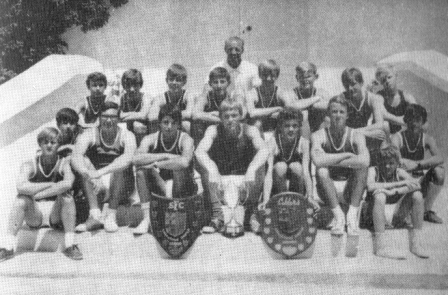 Malta Secondary Schools Sports Champions.
Malta Secondary Schools Sports Champions.
During a very windy month we were fortunate to choose a day with a moderate breeze blowing from the north. Only the Sprints and Long Jump were adversely affected. In a way this was unfortunate as it was hoped that a few of the long standing records might be lowered by the crop of good sprinters which this fourth, fifth and sixth year contain. The ruthless way the two senior boys and senior girls relays were reduced are about the only proof of the quality sprinting we witnessed.
Prior to Sports Day Leeman and Jackson ran an exciting furlong, both getting inside the old record. Leeman just gained first place and set the new record at 24.2 seconds. The senior boys Long Jump was of an exceptionally high standard despite the high wind. Six boys jumped beyond 18 ft. 3 ins. and the first three were within an inch of each other at 19 ft. 5 ins. and 19 ft. 6 ins. John Nicholas won this and received a special award for being the current record holder in the Long Jump for 2nd year, 3rd year, 4th year and winner for 5th and 6th years, and only robbed of another record by the weather. The other athletes who suffered in finals prior to Sports Day were Mary McCosh and Penny Goodfellow. Mary consistently threw the discus beyond the existing record in training, but failed on the day when faced with a stiff wind. Penny was affected by poor jumping conditions and inexplicably jumped two feet below her best jump of last year. Richard Hoctor regained the half mile record for his family, brother Bernard having been the holder two years ago. Richard has a good running technique and has now gained sufficient strength to exploit it, he also won the "Quarter" in convincing style. Another good quarter mile was produced by Nicholas Ferrari, his time of 67.7 seconds is good for a twelve year old and might well have been reduced if he had been pressed by the opposition. Although Michael Elliot disappointed in the Senior High Jump, young brother Jack maintained the family prestige by setting a splendid record for the fourth years, leaping 5 ft. 3 ins,
An under seventeen relay team won an invitation 4 x 110 at the R.A.F. Sports in 47.7 secs, and an under 19 Mile Medley team won an invitation event in the new record of 3 mins. 51.8 secs, at the Royal University Sports. These performances augur well for the coming Inter-School Sports and the M.A.A.A. meeting. The School can expect to bring its short athletic season to a successful conclusion.
J.H.B.
HOCKEY REPORT 1966-1967
We had a very short season this year, five weeks to be exact, within which we had one game against the young ladies; the boys winning by the small margin of three goa's to nil. Our other games came when the school entered the Inter-Service Hockey Tournament Six-a-Side. Due to lack of experience we could not hold our own against better dr'lled teams. Even though, our A team did win two games and lo-'A one, but our B team did no.t fare so well, ioylng three games and drawing one.
A team: D. Scott; A. Wilde; M. Elliot; P. Ross; C. Simmonds.
B team: B. Gunns; J. Field; A. Stackpool; P. Gamble; C. Stevens; V. Ibbs; J. Nicholas.
D. McKelvie had to withdraw due to illness.
A.P. WILDE.
PLEASE MENTION THIS MAGAZINE WHEN PURCHASING FROM ADVERTISERS
REPORT 1966-1967
Cricket
In this competition, as the rest of years due to lack of interest, Drake failed in their attempt for honours, attaining third position.
Swimming
Unfortunately due to lack of overall talent, and any positive showing, Drake kept the wooden spoon for yet another competition.
Soccer
With a combination of enthusiasm and good football, Drake reached second position in the first round of the competition, and surprisingly enough Drake maintained this position, our junior teams deserving special mention, also congratulations to all members of the House who represented the school. Our thanks must go also to D. SPAFFORD for his captaincy of the Drake team.
Rugby
This competition was almost a carbon-copy of football, we almost won but due to a slightly weak senior side, Drake attained second position.
Cross-Country
The first years, ably led by young Ferrari, came first in their age group. This unfortunately was not the result overall, even though in some years we did come second, although once again Drake's name was to be found in the second slot.
Public Speaking
Congratulations to C. STEVENS for his tremendous effort, which was rewarded with first place in the competition, and to the rest of Drake House representatives, thank you in supporting, coming an overall first equal with Nelson.
A fine year for Drake, the lost spirit has been found, as shown by our positions in the various competitions. I should therefore like to say thank you to all the house, and Messrs. McAllister, Morris and Houston for their constant enthusiasm and help throughout the year.
A.P. WILDE. J.M. FIELD.
DRAKE HOUSE-GIRLS
GAMES REPORT
Swimming
This was not Drake's strongpoint. Although everyone tried hard at practices, on the day the other houses proved to be that little bit better. E. Gibson, E. Vaughan, and S. Boyd are to congratulated for their enthusiasm and hard work.
Athletics
Again Drake did not do too well in this, although a few people shone out, these were E. Forrester, E. Vaughan,
Hockey
Drake found their sea feet here and due to hard work and determination took first place in both senior and junior competitions. In the junior team Pat Cross as captain showed ho>w it should be done and amazed the other houses. These wins were well deserved.
The teams being:
Senior: P. Elliott (Capt.), A. Eichman, C. Ashcroft, K. Burgess, E. Vaughan, L. Elson, S. Boyd, A. Coomtes, L. Perry, L. Duigood.
Junior: P. Cross (Capt.), D. Roddy, J. Gregory, J. Bosanquet, V. Kil-patrick, L. Walker, K. McConnel, V. Cunningham, J. Radford, M. Murphy, H. Bick.
Netball The junior and senior teams were: Junior: K. McConnel, C. Fox, P.
Cross, L. Bevin, J. Radford, D. Parker, K. Somerville, V.
Kilpatrick. Senior: P.Elliott, C. Stringer, L.
Elson, J. Stratton, K. Burgess, L, Perry, L. Vaughan, S. Boyd. Both teams played well, although the
junior team only got third place they played well together and were
rather unfortunate. The seniors got a well-deserved second place
losing by goal average to Nelson by one goal. Outstanding players
were K. Somerville and L. Elson.
Tennis The team were: 1st Couple: P. Elliott and A.
Pennington. 2nd Couple: S. Boyd and K. Carberry. 3rd
Couple: P. Cross and L. Vaughan. Again the team played well and were
narrowly beaten by St. Vincent for first place. The
coup'es played well together and gave the other houses a few nasty
moments. Thanks go to Miss Mel]in,g
for her help and unfailing support throughout the year. Without her
I daren't say what may have happened. On the whole the house were
more enthusiastic about their sport than on previous years, and it
was just bad luck that they d;dn't manage to do better. I
hope the next Games Captain has as much help as I have had. Thank
you, Miss Melling.
P. ELLIOT (Games
Captain).
REPORT 1966-1967
At the time of House Reports going to press, only the Inter-House Public Speaking contest has been held. Drake did exceptionally well this year, tying first and sharing the Best House award with Nelson. Christopher Stevens did the House proud by winning the best speaker award. Our thanks and congratulations also go to the other two speakers representing Drake, Ian Stuart and Linda Elson.
At last the blanket for refugees, made up of knitted squares has been completed, looking most gay and colourful. It will be packed up and sent to a worthwhile centre for refugees, before the end of the year.
Looking back on the years Games results, Drake has had a very satisfactory year, and has improved greatly since last year. Special thanks must go to Pat Elliot, our games captain, who has encouraged and supported the house greatly. However, she has sometimes had difficulty finding support and making up some of the Games teams.
Finally, on behalf of the House, I would like to thank Miss Melling, our House mistress, for her great enthusiasm, support and help during the year. Thank you Miss Melling and good luck to Drake in the future.
FELICITY BURGE (House Captain).
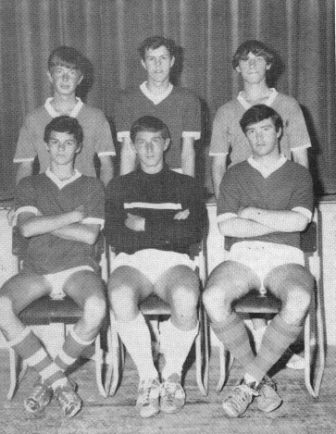
Soccer Six-A-Side team
NELSON HOUSE-BOYS
REPORT 1966-1967
Soccer
After a disappointing start both the 1st year and the Colt's side registered good wins to pull us up to 2nd place, with notable performances by Evans and Mosley in the first year and Stringer and Seoul in the Colts. With Cannon and Lawrence from the School XI and Ross in goal the Senior XI did well and the players of all teams are to be congratulated on a fine 'second - half effort. Cross-Country
The 2nd year were our cross-country stars; excellent contributions from Coombes (1st) Lucas (2nd) and Nicholas (4th) produced our only wins. Unfortunately the remaining teams cou]d not support these performances and despite indiv'dual efforts by Lambden and Evans from the 1st year, and Hayward r.nd Smith in the senior race, we finished 3rd overall.
Rugby
Again Nelson achieved only limited success. The 1st year contained some promising players, in particular Evans, Leeman and Castles. Although the 2nd year were outplayed, their enthusiasm should have been an example to the 3rd year who despite their speed size and weight failed to register a single win. The senior 7-a-side including B. Jackson, K. Lawrence and R. Willett from the XV recorded three spectacular wins, the high-light being their well deserved win over St. Vincent.
Athletics 1966
With very weak 2nd and 4th years we could not repeat the performance jf the previous year. There were however some individual successes: deserving mention were Lawrence, Jackson, Potts and Franks who set up a new 4th year javelin record. Swimming 1966
The Nelson boys team did very well last year only narrowly missing 1st place; the final placing thanks to the girls team, was Nelson 1st. Ahern did well to come second in the senior diving, and Moore, Gunns and Williams did well in the swimming events. This was a first-class effort from all concerned and congratulations are due to all swimmers.
Cricket
Once again Nelson failed to gain that elusive 1st place. Both senior and junior teams acquitted well, but special mention must be made of Franks and Evan Potts, whose batting proved to be a decisive factor in the success of the Senior team. Commons, Franks, Smith, Lawrence and Jackson represented the School XI.
Public Speaking
This is traditionally one of Nelson's strong points and this year proved to be no exception. Due to the efforts of Dave Radford and Peter Ross we came first equal with Drake.
In addition we would like to thank Messrs. Lewis, Tatton and Garvey for their unfailing support both in organizing and attending the various house activities. Finally we wish our successors and the house all the best for next year.
REPORT 1966-1967
Nelson has had a successful year despite the small proportion of senior girls in the house.
We achieved good results in netball and hockey, and I'm sure with more practice our tennis players will be able to provide a good team next year. Nelson won the swimming cup in the 1966 Gala. I'm sure Nelson girls will be able to regain the athletics 'cup judging from the standard displayed this season.
A Public Speaking competition was held in the Spring Term in which Nelson came first, ty;ng with Drake. I was disappointed in the enthusiasm and support shown to this competition from the house.
Finally, on behalf of the house, I
would like to thank Miss Reed for the help and encouragement she has
given us this last year. GAYNOR
HAMLEY (House Captain).
GAMES REPORT
Tennis
First Couple Gaynor Hamley, Sue Kitson. Second Couple Ann Kilpatrick, Karen Croome. Third Couple Angela Radley, Linda Keen. Reservers: Linda M'ahoney, Julia Gardner.
Results
Nelson vs Drake lost 36.
Nelson vs Hawkins lost 45. Nelson vs St. Vincent lost 27.
Report
Although we did not manage to win any of our matches, the team played very well. We were unfortunate to have two of our team unable to play in the first match, thus Nelson had a bad start.
Senior Hockey
Centre Half Angela Radley Centre Forward Liz Moss Left Inner Saidie Lendrum Right Inner Sue Kitson Left Wing Gaynor Hamley Right Wing Ann Kilpatrick Left Half - - Wendy Bucksey Right Half Ann Martin LeftBaek Anne Watson Right Back Kathleen Wells Goal Keepe Lindsay Billet
Results
Nelson vs Hawkins drew 11. Nelson vs St. Vincent won 3-1 Nelson vs Drake. lost 32.
Report
The team played very well, and in the final placings Nelson House came second.
Junior Hockey
Centre Half Jane Devitt Centre Forward Paula Ledwitch Left Inner Ann Pomeray Right Inner Bridgette Coates Left Wing Lindsay Edwards Right Wing Susan Collier
Reserves: Doreen Church, Carol Beckley.
Results
Nelson vs St. Vincent lost 01.
Nelson vs Drake drew 00.
Nelson vs Hawkins won 21.
Report
The result of the junior hockey was disappointing Nelson only coming third. We had a good team, and should have done better.
Senior Netball
Centre Carol Pike Shooter Janet SaddlerCentre Ann Pomeray Shooter Anne Osborne Goal Keeper Beryl Roland
Goal Attack Christine Coupe Goal Defence Jane Devitt
Reserve: L;ndsay Edwards.
Results
Nelson vs Drake won 65.
Nelson vs St. Vincent won 54.
Nelson vs Hawkins won 54.
Report
The team played very well indeed, winning all their matches, and gaining the netball cup.
Report
Nelson House has done quite well this year. Although we lost the tennis, we came second and third in the senior and junior hockey respectively, and won both the senior and junior netball cups. Well done.
ANGELA RADLEY (Games Captain).
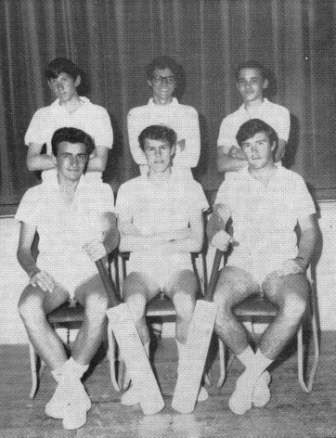
Cricket Six-A-Side Team
HAWKINS HOUSE-BOYS
REPORT 1966-1967
When our turn came round to write the annual house report, we found it an extremely pleasant task in accounting for the previous years success.
Continuing the house trend, the Seniors, once again provided the main stay of the house's success. Perhaps this is due to the influx of "under-nourished juniors" into Hawkins. Despite this setback, the house has moulded a congenial atmosphere.
Undoubtedly the most outstanding achievement of this year was the overwhelming victory of the cross-country team. To this the Juniors contributed no small part to the magnificent overall result. Outstanding runners were Rollison (3rd year), Quirke and Jackson (1st year), Mattingley (6th year), Harrison, Smith and Aldsworth (5th year). The individual year results being: 5th and 6th year first, 3rd and 4th year first, 2nd year fourth and 1st year second.
Once again the seniors managed to maintain their superiority on the soccer field over the past few years. Overall, I am afraid we must report it has been a disappointing year for the house football, due mainly to the lower divisions in the house. The outstanding talent of the side, this year, which has played in the school eleven includes Hopkinson, Fleming, Spence, Mattingley, Aldsworth, Vaughan and Halliday. The latter four received their school colours.
Rugby was the sport in which spirit (the essence of sport) triumphed over brute force. Everyone rose to the occasion and it was a great credit to the tradition of Hawkins. Although failing to win the house competition, the house did extremely well considering the talent available. We were well represented in the school fifteen by Elliot, Field, Spence, McKelvie and Vaughan.
On the academic side, we have managed to maintain our high standard 'n the field of oratory endeavour. P. Edge did extremely well to finish second '.a the "Inter-House Public Speaking Competition". The spirit of personal enthusiasm within the house is the pivot of our house's success. However, this atmosphere could not be possible without the kind co-operation and extreme keenness of our House Masters Mr. Griffiths and Mr. Devine, and for this we would like to render our sincere thanks. N. VAUGHAN (House Captain).
S. SPENCE (Games Captain).
HAWKINS HOUSE-GIRLS
REPORT 1966-1967
This year, as usual, has been fairly successful for all House activities, and I would like to congratulate all those who took part in them.
During the Christmas term we knitted squares for half a blanket which was to be joined to the half which St. Vincent were knitting. However, both "halves" were large enough to be separate blankets, due to the enthusiastic response to the request for squares, and we decided to send ours to the girls of an orphanage in Hamrun, who were extremely grateful to receive it. My thanks to Judith Cross and Jenny Perkins who finished it off so neatly.
In the Public Speaking Competition, held during the Easter term, we came equal second with Nelson House. The representative speakers for the girls were Beryl George and Elizabeth Jameson. I hope the House manages to retain this sort of standard in the Athletics, and swimming yet to come.
Lastly, on behalf of the House, I would like to thank Mrs. Gerrard for her unending support and encouragement throughout the year.
ELIZABETH JAMESON (House Captain).GAMES REPORT
The swimming gala last year was fairly well supported and Hawkins girls managed to come third.
This school year began with a good but not very successful effort by the house tennis team. They managed to come third. This was followed by a rather weak effort on the part of the senior hockey team who came fourth in the hockey tournament. In the Spring term the junior hockey team did better but still only managed to achieve third place. After half-term the netball season began and the seniors played quite well. Unfortunately Drake, Hawkins and St. Vincent drew for second place and on goal average the seniors dropped to third place. The juniors did very well and came second in their contest.
The athletics does not seem to appeal to the house as much as the winter sports d;d but we have a team who are good sports and who, I am sure, will do their best.
On the whole this has been a good year for sport. The results have not been wonderful but the teams have been enthusiastic and have all done their best.
WENDY COUPE (Games Captain).
ST. VINCENT HOUSE-BOYS
REPORT 1966-1967
FootballAn extremely good season for the "Saints". The Colts dominated the scene by winning all their games -- usually with a comfortable margin. It is impossible to name individuals from this excellent team, but congratulations must go to their captain J. Stackpoole. Our 1st years also played extremely well and Ellis, Williams and D. Mulvaney must be mentioned. Unfortunately the senior results do not match up to the junior sides. However with great spirit and the patient guidance of Mr. Tomlinson they managed to win half their games. Congratulations to the house for winning the cup for the third consecutive season and to "Gus" Donaldson on receiving his colours. Rugby
Our success has not been limited to soccer, however, for once again the house has won the rugby cup. Due to their unwavering spirit, the 1st years remained unbeaten. So too did the second years, who fielded a solid team, the backbone of which was Grimes in the three-quarters. The Colts, captained by B. Gibbins, played well and they too were unbeaten. The Seniors, although failing to win all their games played well, with "Gus" Donaldson and Ron Leeman the stars of the side. Cross-Country
Not a very popular sport and not very well supported by the House. The under XV's and 2nd year teams managed to come second. Our other two teams did not do so well and St. Vincent came fourth overall. Congratulations must go to S. Pelan who came second in his race. Athletics
At the time of going to press, all the events have not yet been held. So far the most notable results have been: R. Leeman's win in the Senior shot-put and R. Frewing's win in the IV year's long jump. At the moment the forthcoming Sports Day looks like being a successful one for St. Vincent. With luck we should, at least, equal the success of last year, when the House finished second.
Public Speaking
Support for this contest is never very enthusiastic and "volunteers" are hard .to come by. Gordon Sharp, however, stepped forward readily and went on to secure third place. It is hoped that his original enthusiasm was in no way spoilt, when he discovered that the ฃ5 prize was merely a figment of the House Captain's imagination conceived to attract volunteers. Cricket
Each house fielded two teams in this competition. The under XV's won their three matches, with R. Frewing contributing greatly to their success. The Seniors too were quite successful, winning two of their matches. Credit must go the often harrassed but always cheerful leadership of Jack Ferret.
Swimming
Captained by Reg Woodcock, the team did very well indeed and managed to round off a very successful season by winning the gala. St. Vincent has won the cup for five years in succession. Well done all and good luck in this year's gala.
To sum up, the House spirit, over the last few years has been outstanding. This may be seen in the many successes enjoyed by the House. This is due, >n no small way, to the unfailing support of our House masters Mr. Tomlinson, Mr. Jackson and Mr. Kitson. Together with the House Captain, Alan Miller, and on behalf of the rest of the House, I would like to offer our thanks.
ALAN MILLER (House Captain). CHRIS McCREADY (Games Captain).
ST. VINCENT HOUSE-GIRLS
REPORT 1966-1967
On being appointed House Captain for St. Vincent, I had very mixed feelings. I was certain that the task ahead would be both difficult and demanding. I did not know whether or not I was capable of doing it. However, these fears were dispelled when I realized that each member was willing to do her share of the work.
There is always something new happening at Tal-Handaq. There are always events to prepare for. Most people do not like to volunteer but with a little encouragement every member did her best. This is obvious from the results of the years work, up to date, both in the social and sporting field.
The School Play, "Dear Brutus", by P.J. Barrie presented the school with a new and promising actress from St. Vincent, Felicity Brooke.
The results of the Public Speaking Competition were also fairly pleasing, although we did not have any winners from among the girls. I am quite sure that all the competitors must have had an acute attack of "stomach butterflies" before the start, and that is why I wish to congratulate Elizabeth Hooley and Kathy Carey on their effort and pluck. Elizabeth had the doubly difficult task of being the first speaker.
The knitted blanket for the War on Want Campaign, mentioned in the House report last year, has only recently been completed. We found it unnecessary to join it with Hawkin's blanket, as it was big enough on its own. The House contributed seven shillings and eightpence towards some lining for it. I chose a very bright, warm red colour. The blanket now looks much more cosy. The lining 'cost seven shillings, and I put the remaining eightpence into the charity tin.
The Junior House Plays, the Verse Speaking and the Concert have still to come. In connection with the House Plays, if St. Vincent can produce the same standard of acting from the members of the 1st and 2nd forms as it did last year, we will undoubtedly have another victory. I noticed that this event proved particularly popular. It seems a pity that the Senior members of the House find it embarrasing to do this type of thing. As an alternative, I feel it would be a nice gesture if they could endeavour to support the various societies and varied meetings which the school holds from time to time. For instance the Literary and Debating Society organised a very interesting debate between Paola Technical School and Tal-Handaq. I am sad to say that this was poorly supported by St. Vincent.
On the whole though, I feel proud of St. Vincent. The majority of its members endeavour to keep to the uniform, although an assortment of brightly coloured anoracks seem to be on the market and skirts seem to shrink with every washing.
It is always when we look back over events that we realize where particular thanks are due, and so on behalf of the House, I would like to thank Mrs. Dewstowe for her unending support in all activities.
I must also make one final vote of thanks to the Vice Captain, Lynne Edmonds, the Games Captain Sally Rathmell, and the Year Representatives, who have been so reliable throughout the year.
LOIS REED (House Captain).
GAMES REPORT
1966 Swimming Placed third.
Tennis
After being placed second to Nelson last year, we were very pleased to win the cup this year. The team consisted of:
1st Couple -- R. Hopkinson, A. Elliot. 2nd Couple S. Rathmell, C. Carey. 3rd Couple L. Edmunds, C. Bevern.
Reserve -- H. Coggersham (also played).
Netball
St. Vincent did not keep the standard of play of preceding years. The junior and senior teams were both placed fourth in the tournaments. The senior team felt the absence of Anne Elliot who could not play due to a hand injury, but the general attitude lacked enthusiasm. The juniors, however, were enthusiastic but lacked general positioning in the court.
Senior Team
E. Hooley P. Goodfelow S. Rathmell C C. Mattingley WD C. Carey GD C. Bevern GK L. Reed Res.: M. Smith (also played).
Hockey
The senior hockey team played quite well but because of the strong competition from Nelson and Drake, we were placed third. The junior team played very well, coming second and losing the final by only one goal to Drake. I hope the seniors will play more as a team next year.
Senior Team
GK L. Reed LB E.Mortan RB A. Brickell LH C. Pullman CH P. Goodfellow RH B. Rooney LW C.Mattingley LI C. Carey CFA. Elliot RIS. Rathmell RW M. Raffell
Junior Team
G. Ricketts J. Collier Carberry Holland Gilbody E. Wilson C. Sykes S. Nelson V. Shirley S. Stanley (Capt.) S. Knight Res.: H. Whitehall, V. Leach.
General Report
First of all, I would like to say how sorry we were to see Robina Hopkinson leave. She provided the backbone for all the senior sports and gave invaluable coaching to the juniors.
Despite some disheartening results, I feel St. Vincent did fairly well throughout the year, but as was expected, the juniors showed more enthusiasm than the seniors. With a lot of the junior players coming into the senior school next year, I hope the senior hockey and netball teams wall take better shape. Finally, I would like to thank Mrs. Dewstowe for all the help and encouragement she has given us throughout the year.
SALLY RATHMELL (Games Capt.)
6, CATHEDRAL STR., SLIEMADRESSMAKER & FASHION SHOP
BONETT STORES
THE BEST SHOP ON THE ISLAND FOR
UNDERWATER EQUIPMENT AQUA LUNGS FOR SALE/HIRE
55, TOWER ROAD, SLIEMA Phone 39/35443
ATHLETIC SPORTS 1967
RESULTS OF THE INTER-HOUSE SWIMMING GALA
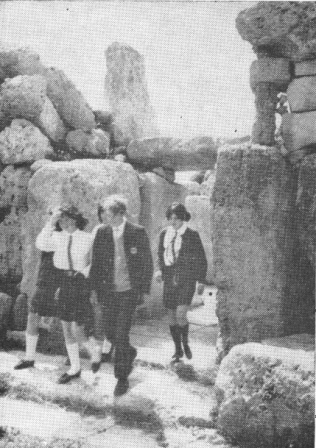
HELD AT THE FLEET LIDO, RICASOLI ON JULY 8TH, 1966
Vth Year visit to Hagar Qim.
Rugby Seven-A-Side team
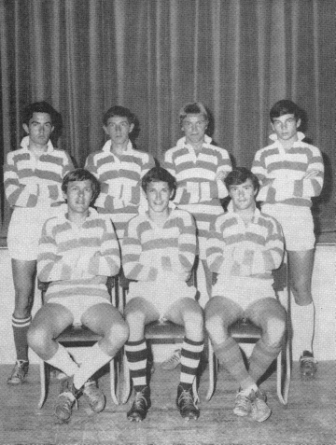
HOMEWORK School is over, now
I'm home, "Homework now," hear me groan Out come
the books and down to the grind, Where's that
pen, I've got .to find, History, Maths,
Geography too, All these things I've GOT to do,
I'll never get my homework done, Never, never,
never. History done, and French galore, AM this
homework's such a bore English now, maths is done, Will I ever have
time for fun? English I like, although I'm not keen, Ite taking ages
or so it may seem. Ill never get my homework done Never, never,
never. English done Oh! good,
at last Now I'll get the rest done fast, Almost
finished a word to write Look at my writing, what a sight,
Finished at last, hip, hip, hurrah, Now all's done I'll go
and play, I thought I'd never get my homework
done Never, never, never. EILEEN FAG1N IB.
WHAT IS A FRIEND A friend is a person of great
understanding Who shares all our hopes and ooir schemes,
A companion who listens with infinite patience To ail
our plans and out dreams. A true friend can make all our
cares melt away With the touch of a hand or a simile,
And with calm reassurance make everything gay, And life
always seem more worth while. A friend shares so many bright
moments of laughter At even the tiniest thing. With memorable hours of
light-hearted banter And pleasure this sharing can
bring! A friend is a cherished and
precious possession Who knows all our hopes and our
fears, And someone to treasure with love and compassion,
With a closeness that grows! through years. DEBBIE BRADLEY 3B.
ANDORRA
Andorra is high up in the mountains between France and Spain. The mountains are the Pyrenees, which make the border of Spain and France. It is a very small and hilly country, with the hills covered with Wild Flowers of all sorts. The mountains around are covered in snow all the time, and when some of the snow melts, it forms lovely streams and huge water-falls which rush down the mountain side to mate small rivers in the valleys.
The capital, Andorra, is the largest town, while the other villages are made up of only a few houses. The Andorrians keep cows, goats and a few sheep They are very hard-working people.
CHRISTINE BALL -- 1A1.
THE STORM
First come the clouds, the massive storm clouds Thick, black terrifying in form They envelope (the hills in a dark wet shroud, These are the clouds that herald a storm.
Then comas the rain, the cold driving rain, Filling the hollows, swelling the streams Beating tattoos on the window pane Penetrating even the deepest of dreams.
Lightning flashes, Ripping the sky asunder, Followed by tie peeling crashes Of tremendous rolling thunder.
After the storm; comes the sun, And the rainbow, seven coloured arc Of light, showing the storm is done.
IAN BRIGGS 4Q.
ANTIGUA
Antigua is an island in the West Indies surrounded by beautiful beaches. It is roughly the same size as Malta but the population is very much smaller. There are two American bases on the island, even though Antigua does not have its own independence and is still under the British Government. There are plenty of hotels in Antigua and they are almost always full. One of *he reasons Antigua has so many tourists is because the climate is hot all year round and also because the island is quiet. There have been a lot of film-stars and members of the royal family visiting the island.
There once used to be a sugar factory
on the island but it had to close down as there was not enough water
for .the sugar cane. The main music on the island comes from the
steel bands. The steel drums consists of oil drum* with the bottom
cut off and the top bent inwards to form the sound.
GRAHAM BOYD 1C1. RETURN TO THE CLASS I must go back to the
class again To the lonely desk and pen For
break-time is over And sorrow begins again. I must crawl back to
the class again To the wretched toil and strife
To my book covered with stains and blots Oh what a
horrible life ! I must drift back to
the class again To slave and sweat till When
That joyous sound of the dinner-bell Will once
more ring again.
CHRISTOPHER MORRIS
and MICHAEL PATTEN2A2.
SINGAPORE
Singapore is just outside Malaya. It is
beautifully hot and sunny, but it rains quite a lot. There are not
many flies, but there are a lot of ants. The people that live there
are Malayans and they make their living mostly in the rice paddies
and on the rubber plantations. There are a lot of mosquitoes. The
people who get bitten by these insects have to have four thin poles
up at each corner of their bed and a net on top of these poles with
the ends tucked under the mattress. It is so hot that you only need
a sheet on your bed and most of the windows do not have glass but
have shutters instead. Everything is very cheap and of good value.
In most houses there is a big electric fan on the ceiling.
JANE PAGE 1A1.
CORAL ATOLL
My sister and I were born on a coral atoll, Tarawa. Tarawa is one of the Gilbert Islands in the Western Pacific.
It is a very infertile island because the soil can hardly grow anything except for coconut palms, bread-fruit and pandanas palms. By digging and keeping the plants well watered you can grow bananas, yams, taro and babai, and with care you can grow tomatoes, Chinese cabbage, shake beans, limes, etc. Water is kept in concrete tanks.
Tarawa is forty miles in circumference and the twenty-five atolls stretch to about nine hundred miles.
The islanders are noted for .their trust and friendliness.
CLAIRE BARRACLOUGH 1A1.
Back to top
